Everyone has an opinion on what’s working in affiliate marketing, but no one seems to have the data to back it up.
To cut through the BS and discover what successful affiliate marketers are doing right now, we surveyed 2,270 professional affiliate marketers.
Specifically, we wanted to discover what strategies are working for them, what separates the 6+ figure earners from the rest of the field, and what it really takes to build a successful affiliate marketing business in 2024.
We’ve been teaching affiliate marketing for over 10 years, and even we were shocked by some of our findings.
Here’s a summary of the most interesting findings and key affiliate marketing statistics:
We asked everyone how much they make, and found that the average affiliate marketer earns $8,038 per month.
We also cross-referenced traffic with earnings and found the average affiliate website RPM is $149.76.
Affiliate marketers with 3+ years of experience earn 9.45x more than beginners. If you’re just starting out, stick with it!
Out of 19 broad niche categories, we found that the 3 most profitable niches are Education/E-Learning, Travel, and Beauty/Skincare.
If you’re having traffic problems, you’re not alone. 45.3% of affiliate marketers say getting traffic is their biggest challenge.
82% of websites earning 6+ figures annually monetize with display ads and affiliate products. If you’re not using both, you’re probably losing money.
Affiliate marketers earning $10k+ per month are 1.5x more likely to socialize with other affiliate marketers. If you haven’t started networking, now’s the time.
Only 25.1% of affiliate marketers have been negatively impacted by recent search algorithm updates. Given the recent doom and gloom, we’re surprised the number is this low.
31.3% of affiliate marketers earning 6+ figures annually considered giving up at some point. If you’re feeling some doubt, keep going. Success may be just around the corner.
About This Survey
We surveyed 2,270 affiliate marketers with a wide range of experience levels, monthly earnings, and team sizes.
This allowed us to cross-reference experience, earnings, and team size data with questions about traffic sources, monetization methods, and general affiliate marketing strategy.
To reach a large audience, we sent the survey to our email list with over 100,000 subscribers, promoted it on our Podcast, mentioned it on Twitter, and shared it in our Facebook and Discord communities. We also ran some Twitter and Facebook ads to increase responses.
The average respondent had 2.8 years of experience, but participants ranged from less than 1 year to over 10 years.
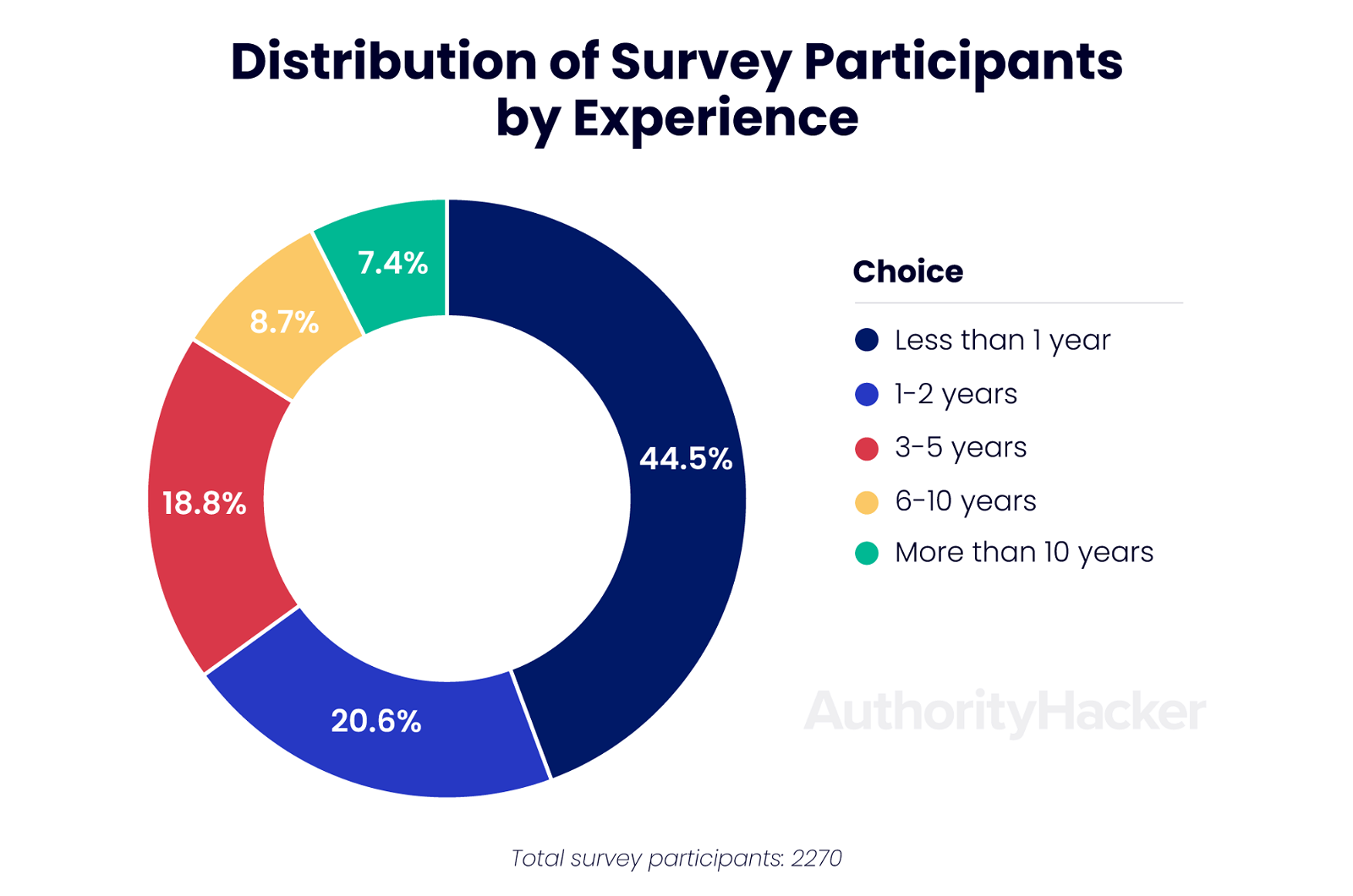
Throughout the survey, we consistently found that affiliate marketers with more experience and earnings used different tactics than beginners. We’ll discuss all of these differences at length.
The Authority Hacker audience predominantly includes website owners, so the findings reflect affiliate marketing strategies related to websites more than other methods.
The respondents also represent a diverse range of affiliate marketing niches, giving us broad insights into what’s working across many verticals.
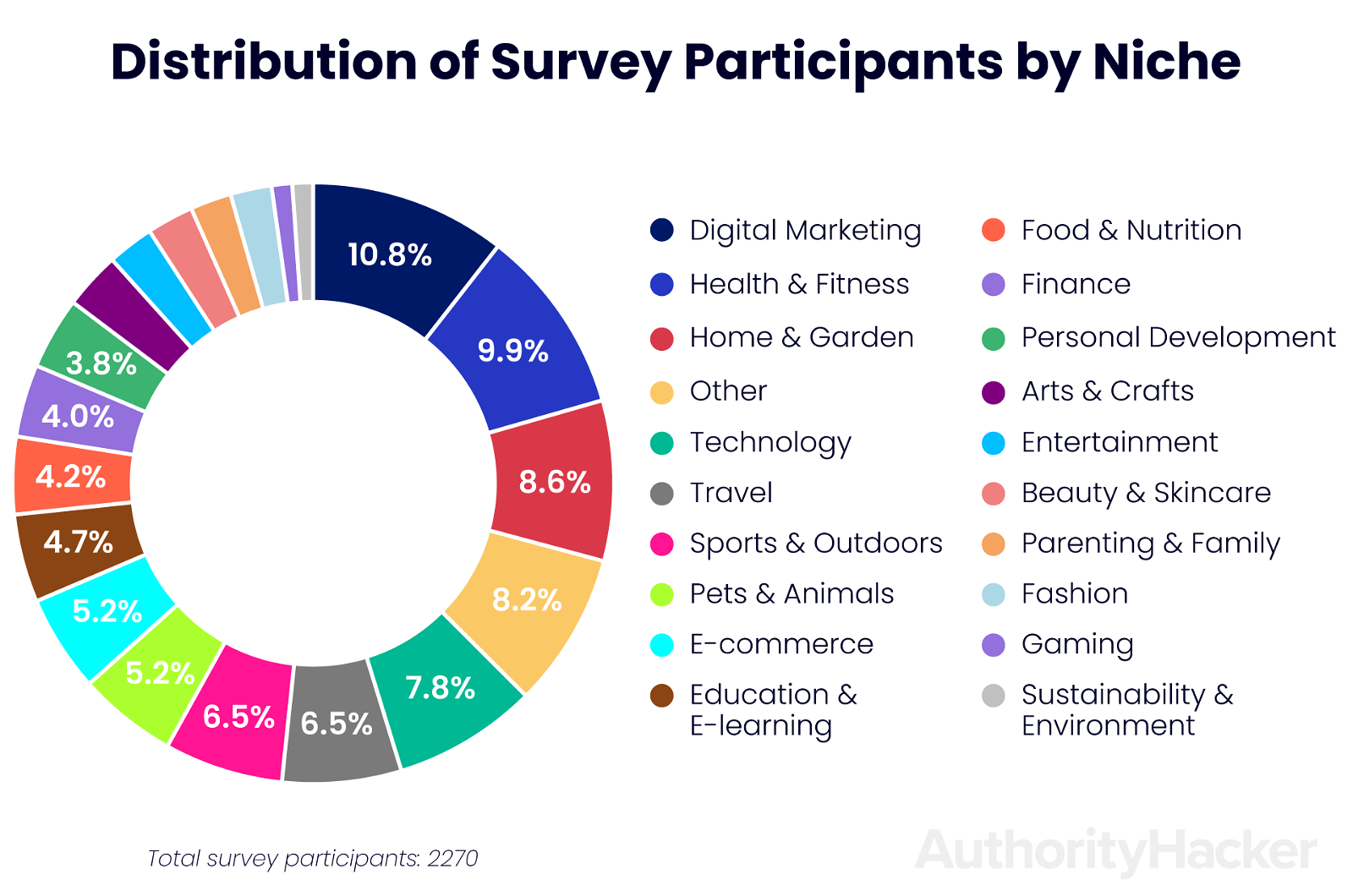
With no niche making up more than 10.8% of respondents, we have a nicely distributed snapshot across many verticals. This variety strengthens the data by reducing potential niche-specific biases.
The Average Affiliate Marketer Earns $8,038 Per Month
Across all experience levels, the average affiliate marketer earns just over $8,000.
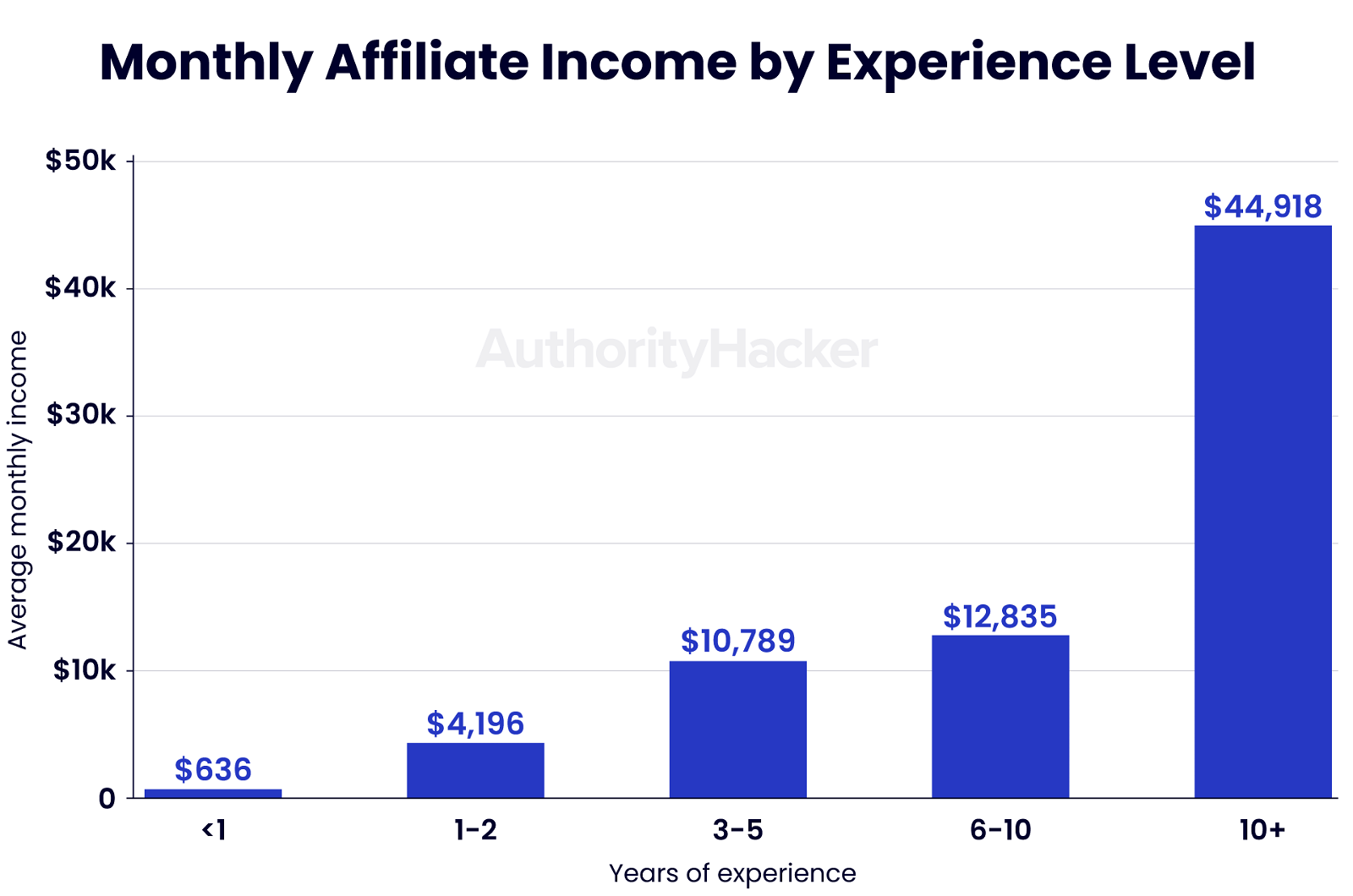
That’s over $96,000 per year – a terrific salary for a location-independent position that lets you set your own hours and make your own decisions.
If you’re a beginner with people questioning your decision to start affiliate marketing, share this stat with them and explain just how much potential there is to earn a real living.
There’s also a clear correlation between more experience and earning more money – no surprise there.
What caught my attention is the enormous gap in earnings between beginners and those with 3+ years in the industry.
- Affiliate marketers with 3+ years of experience earn 9.45x more than beginners.
- Even if you remove the most experienced respondents, those with 3-5 years of experience earn 4.46x more than newcomers.
- Marketers who have been in the game for 10+ years make approximately 6.31x more than everyone else.
The takeaway?
There’s a two-year “beginner’s hump” that newcomers to affiliate marketing must overcome. If you get over that hump, your earning potential shoots off the charts.
Affiliate Marketers Earning 6 Figures Annually Have 6+ Team Members
We know how challenging building a team is, but you shouldn’t let the difficulties stop you. The data shows it’s a crucial part of growing your revenue.
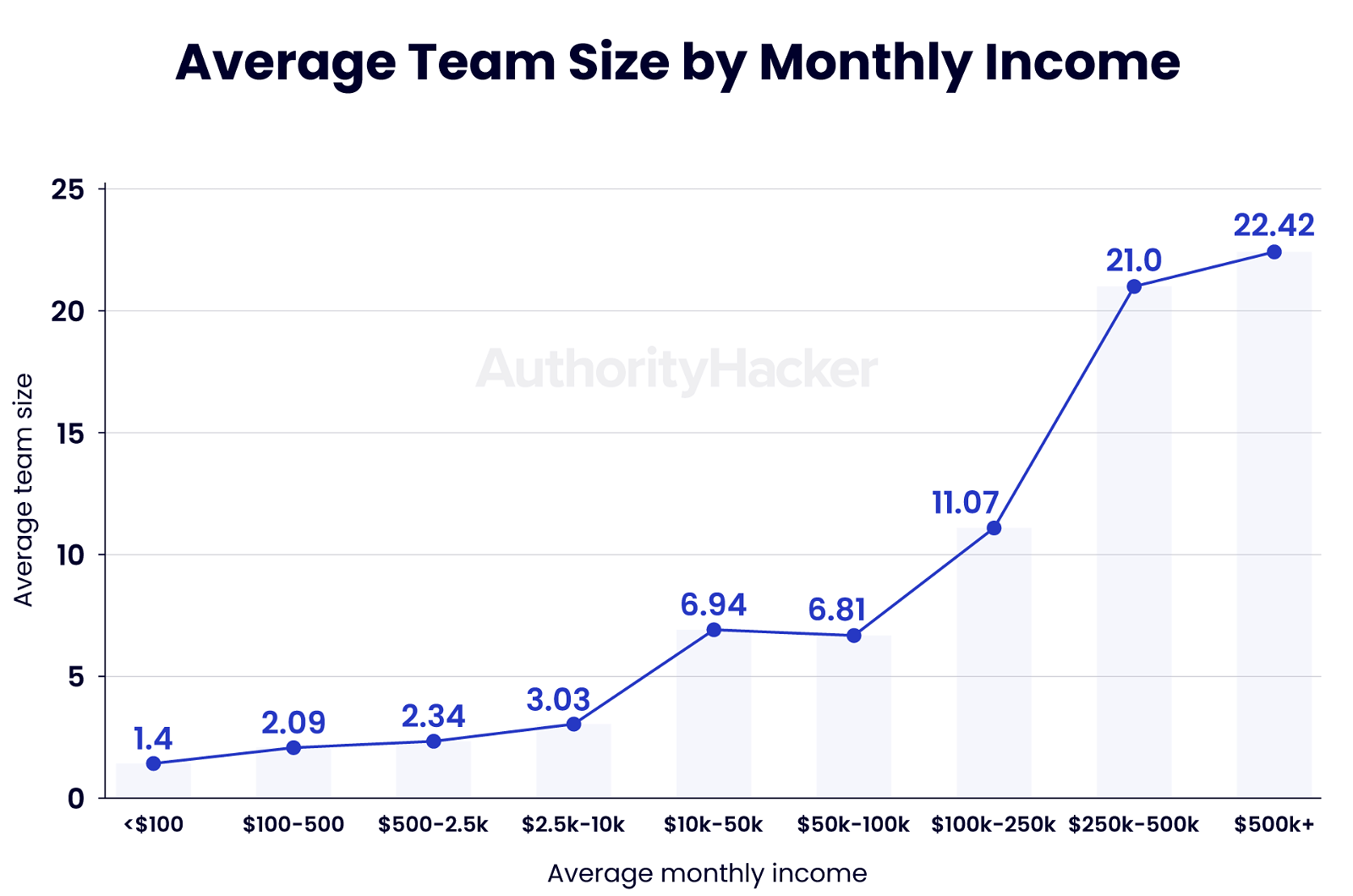
My recommendation? Use the above graph as a general guide to check if you have an appropriate number of team members.
If you’re making $5,000 per month but are still a solopreneur – or earning $25,000 per month with 3 team members – there may be opportunities to grow your business by making new hires.
Of course, there’s a lot of nuance, such as what positions you should hire for or how much you should pay.
This survey doesn’t go into those details, but the data suggests that if you’re finding success, you should hire people to handle less important tasks so you can focus on what truly moves the needle in your business.
The 3 Most Profitable Affiliate Niches Are Education/E-Learning, Travel, and Beauty/Skincare
Of the 19 broad niches we asked about, these 3 were the most profitable.
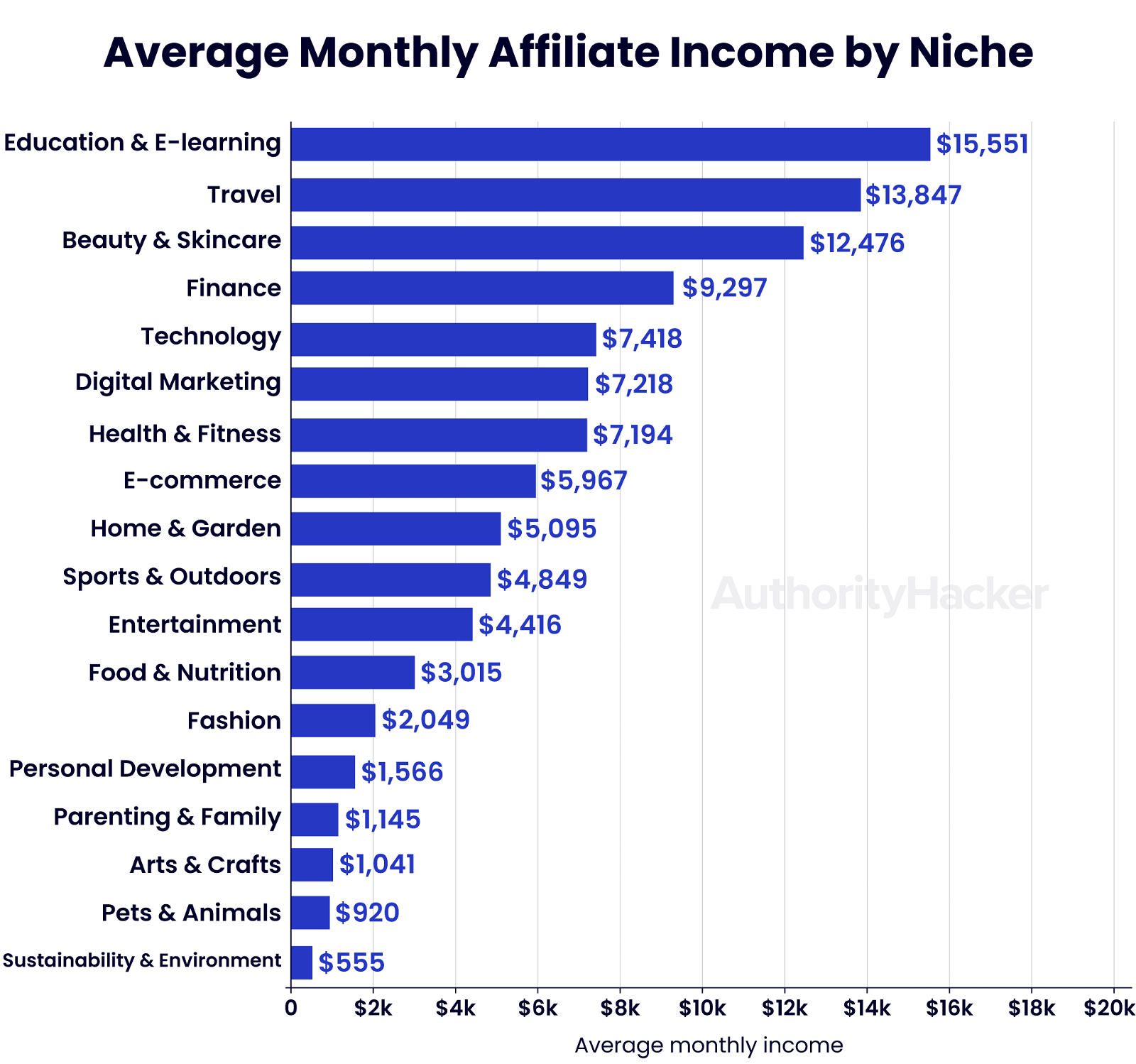
There’s also a clear gap in earnings between the top 7 niches – which earn over $7,000 on average – and the rest, which earn ~$500 to ~$6,000. The highest-earning niches are generally more competitive, so beginners may be avoiding them.
However, most niches still leave plenty of room for substantial income. Of the 19 niches included in the survey, 11 earned an average of over $4,000 per month, which generally equates to “job replacement income.”
When we compare monthly earnings to RPMs, the gap between the highest and lowest niches gets noticeably smaller. However, the order shows little change for most niches.
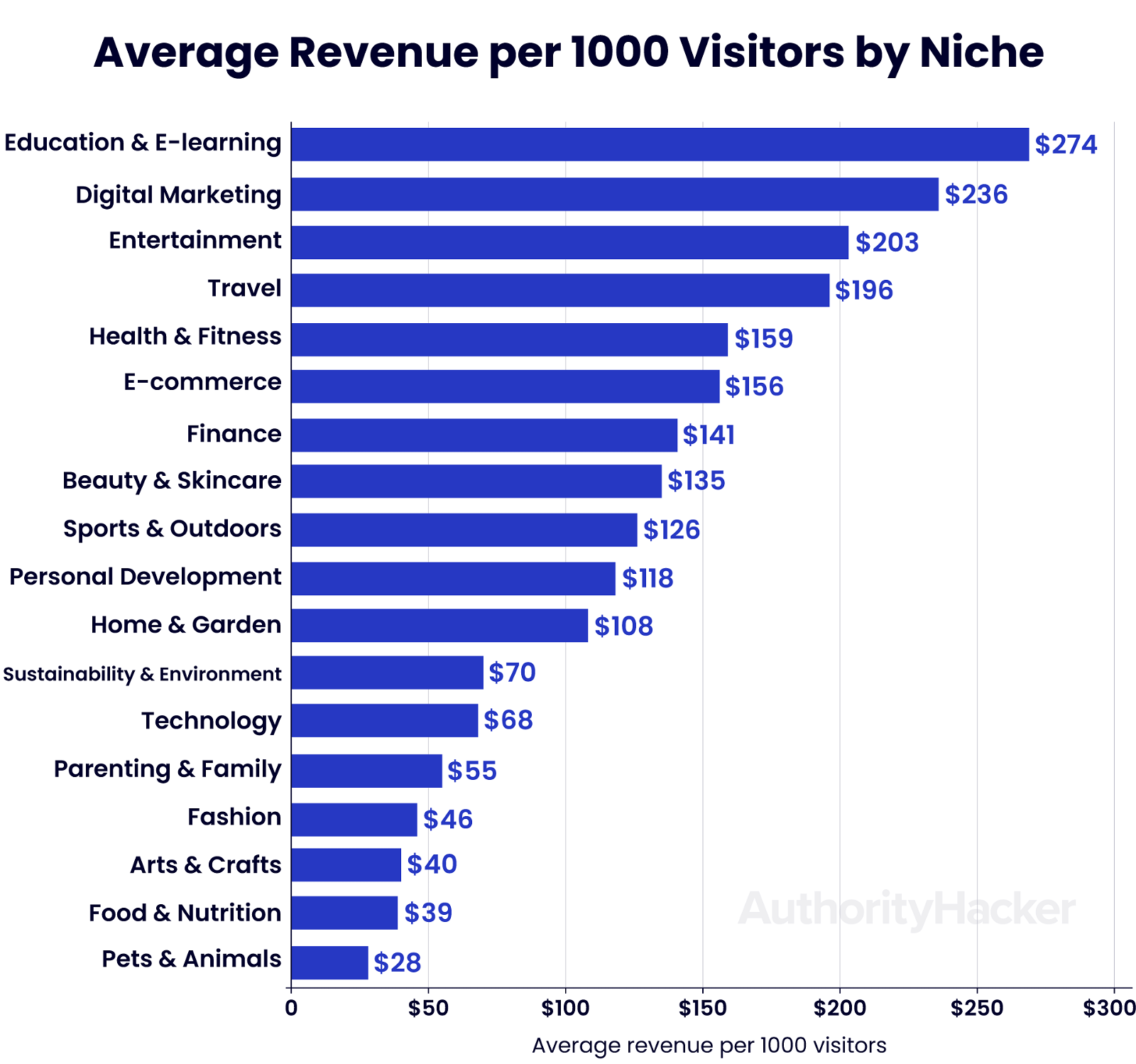
This shows that the most competitive niches tend to have the highest RPMs, and that RPM plays a huge role in determining the profitability of a niche. If you’re considering a tougher industry, you’ll be rewarded with a higher earnings ceiling.
Average Monthly Website Traffic For Affiliate Marketers Is 56,673 Visitors
With just over 50,000 visitors on average – and the enormous potential to increase affiliate RPMs – most site owners can be optimistic about earnings, even if growing traffic is a challenge.
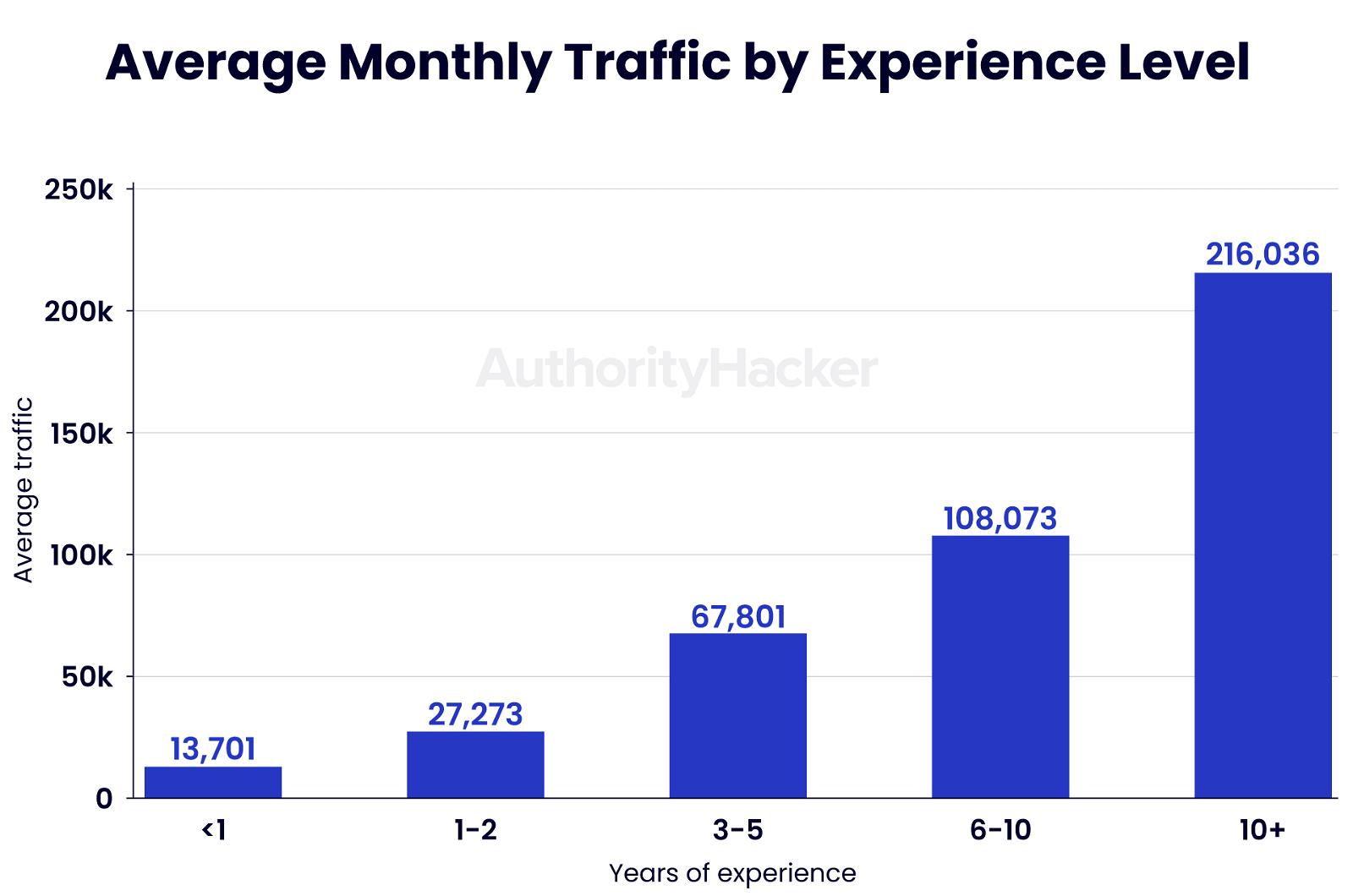
The average traffic growth for each additional year of experience is 53.49%, so even if you’re a newer affiliate marketer without much traffic, the data says you should stick with it.
We also broke the traffic down by niche, and found the highest-traffic niches include technology, beauty/skincare, and food/nutrition.
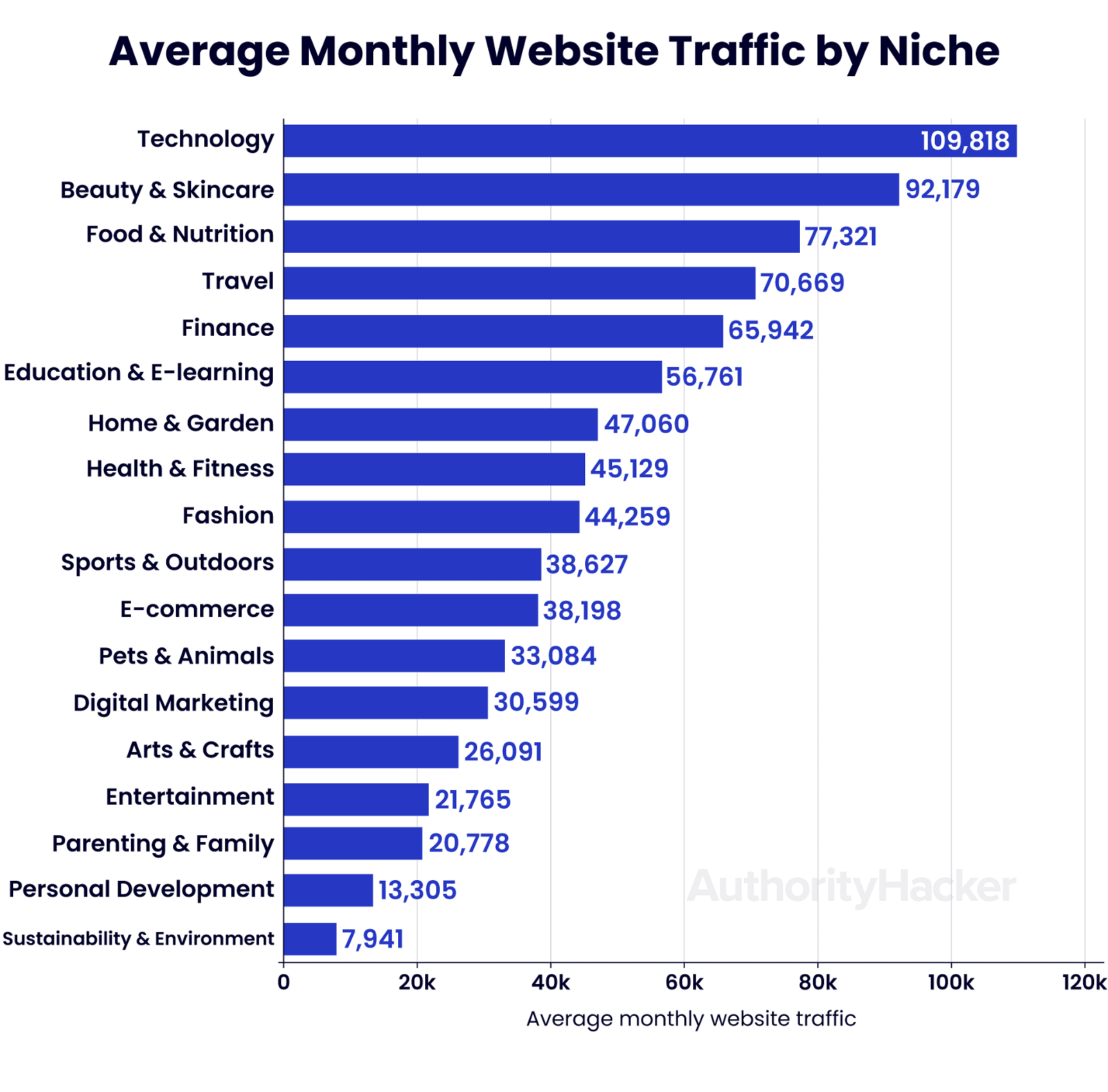
Niches with the most traffic are also generally aligned with the highest-revenue niches. No surprise there – traffic is essential for growing revenue.
Marketers Who Choose Products Based on Market Research Earn 47.16% More Than Those Relying on Commissions or Personal Experience
We cross-referenced product selection methods with earnings, and found that high earners tend to choose products based on current trends and audience demand.
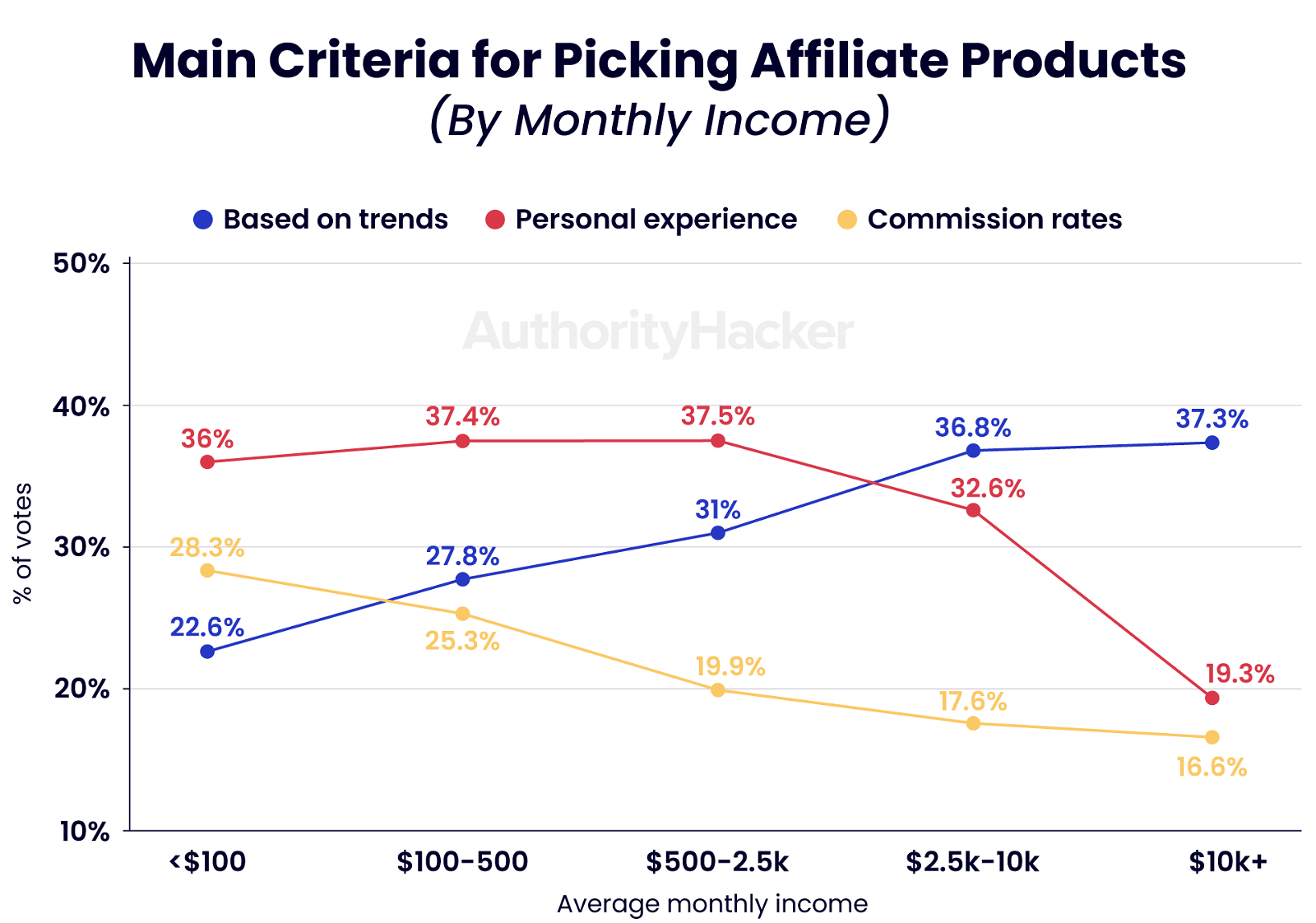
Choosing products based on commission rates or personal preference often isn’t the best move – earnings increase as affiliate marketers move away from those strategies.
This suggests a data-driven and “ear-to-the-ground” approach to product selection – AKA staying current in your niche, identifying trending topics early, and capitalizing on them – provides the best ROI for experienced affiliate marketers.
However, you shouldn’t chase trends if you’re a beginner. Promoting products you have personal experience with is the best approach for those making less than $2,500 per month.
This is likely because you can create better content about products you know about, which helps make up for the low authority of a newer site. More popular topics are also more competitive, and it’s tougher for marketers without authority or resources to find wins.
45.3% Of Affiliate Marketers Say Getting Traffic Is Their Biggest Challenge
Traffic is the thorniest problem for many affiliate marketers. This is followed by converting that traffic to sales, which 19.5% of respondents mentioned.
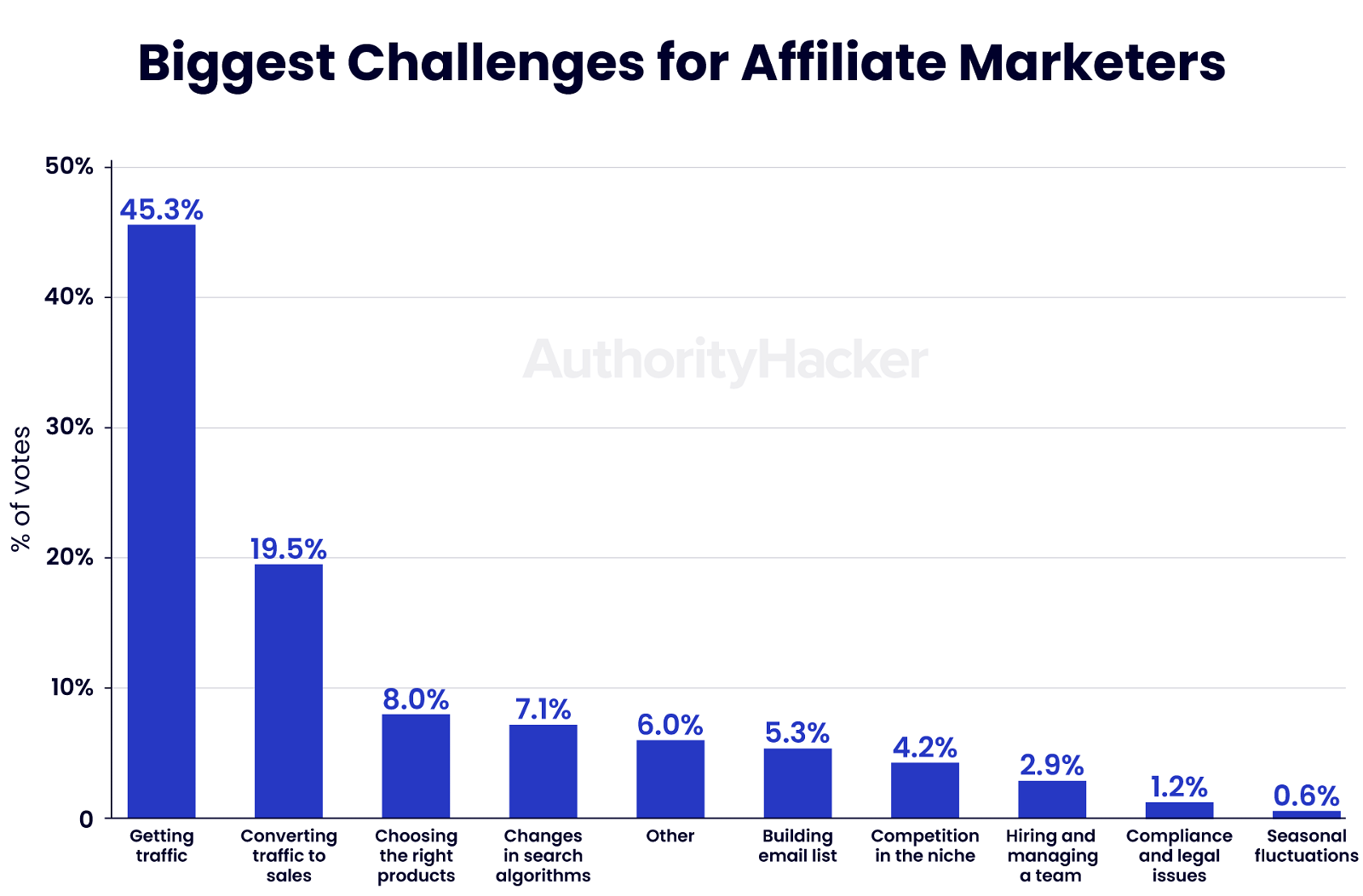
This makes sense, given the many beginners who responded to the survey. When you’re not getting much traffic, it’s hard to have other problems.
If you’re having problems getting traffic, know that it gets easier over time. While 51.4% of respondents with less than a year of experience said traffic was their main problem, that percentage dropped to 33.3% for those with 6+ years of experience.
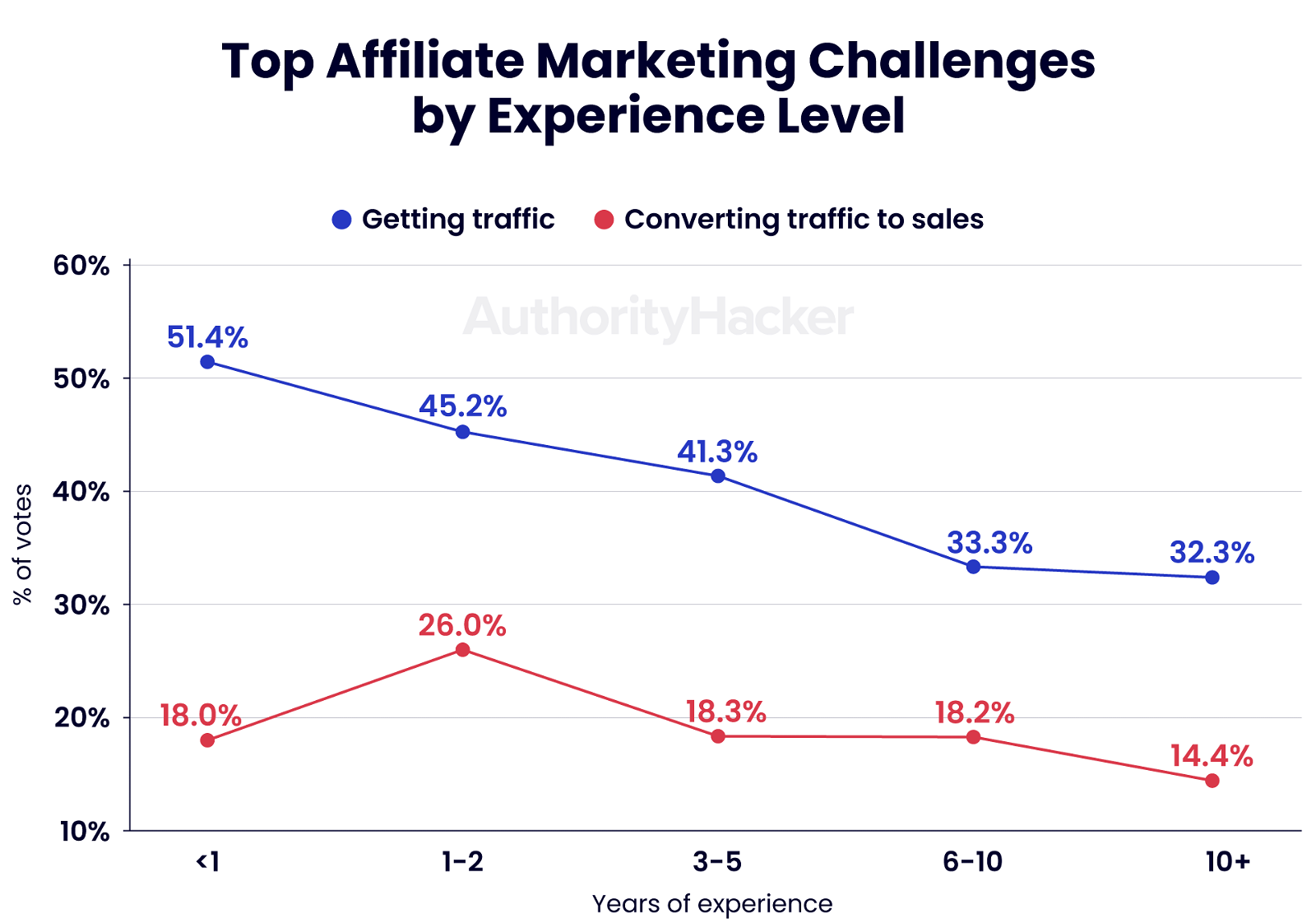
Interestingly, converting traffic to sales consistently remains a problem until the 10+ year mark. For some people, getting the hang of conversion optimization is a tougher nut to crack than generating traffic.
Affiliate Marketers Earning $10,000+ Per Month Struggle With Building/Managing Teams And Changes In Search Algorithms
People earning over 6 figures a year face a more diversified set of challenges. Even though traffic is still the top issue, only 17.33% of high-earning marketers said it was their primary obstacle.
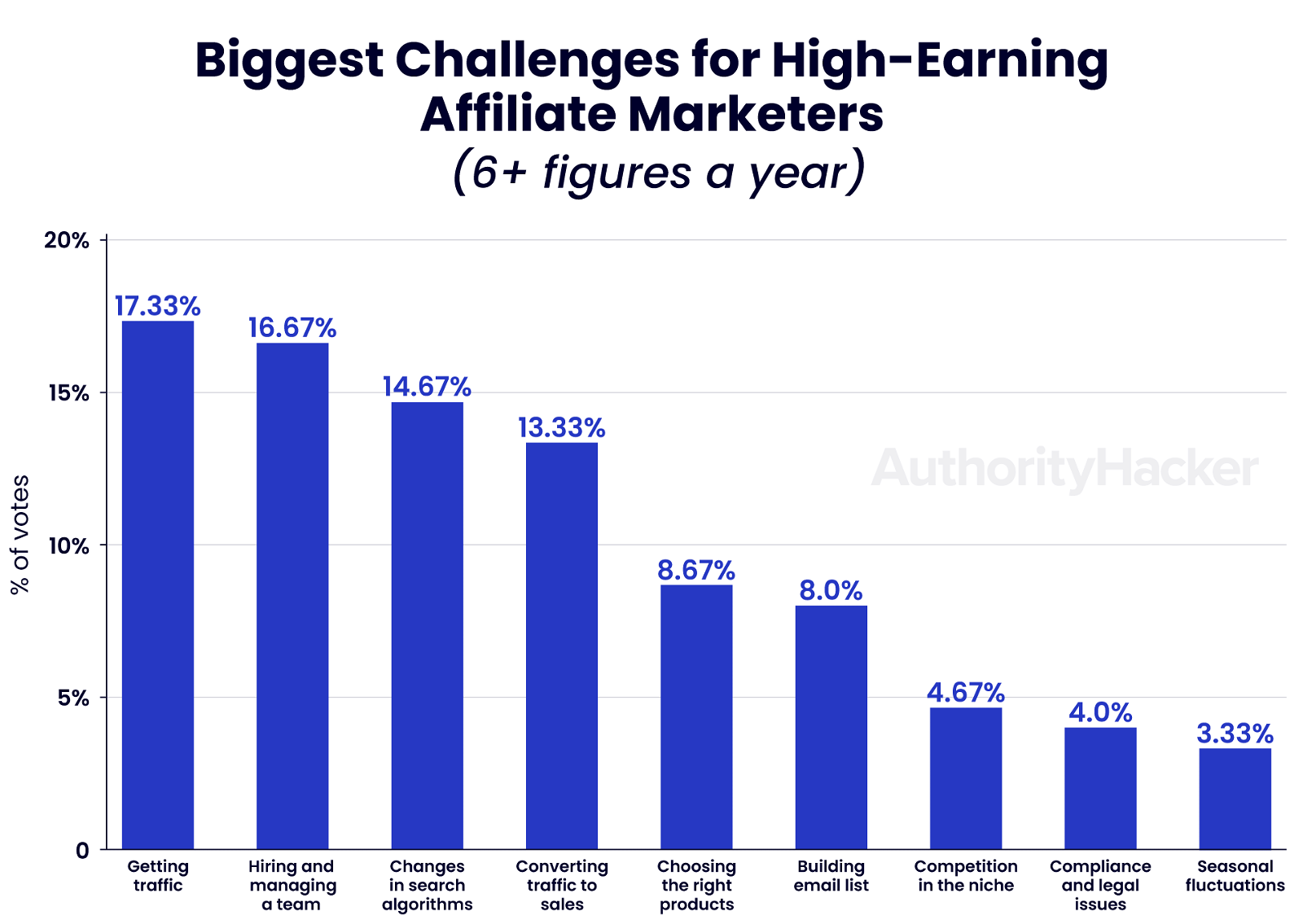
The problems that rise to the forefront for high earners include hiring and managing a team and dealing with changes in search algorithms.
Converting traffic to sales is still a challenge, but many respondents earning 6+ figures seem to have solved their traffic and conversion problems. This indicates getting traffic and converting that traffic are the main skill sets needed to reach a 6-figure annual income.
78.3% Of Affiliate Marketers Use SEO As A Primary Traffic Source
Affiliate marketers love organic traffic strategies, with SEO and organic social media labeled as a primary traffic source by 78.3% and 35.5% of respondents, respectively.
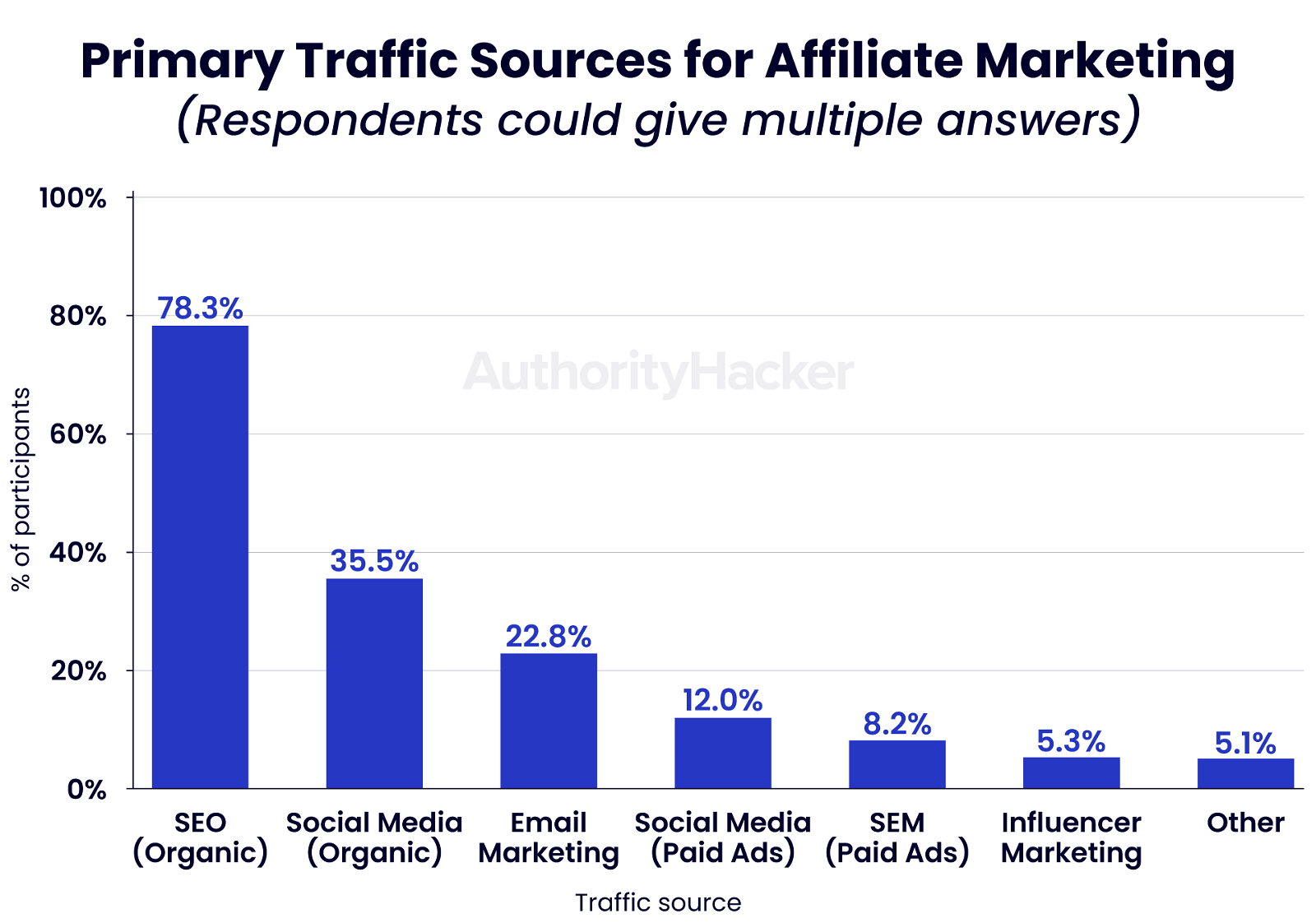
Paid advertising methods like SEM and paid social media ads are less popular, with only 20.2% of respondents using them.
Organic methods require less upfront investment, tend to have a higher ROI, and are generally more forgiving, so it makes sense that affiliate marketers heavily favor them.
The third-most popular traffic source is email, with 22.8% using it. This is likely because email provides a higher ROI than other traffic sources. (More on that later in the survey.)
Interestingly, those earning 6+ figures diversify their traffic sources 21.56% more than average. Their main diversification channels include paid ads and email marketing.
Risk mitigation is a potential motivator for diversification, but this is more likely a natural consequence of marketers seeking higher revenue opportunities. The increased focus on email may be the source of the higher earnings.
These trends are in line with what we teach. Beginners should start with 1 traffic source and learn it well, then explore secondary sources when they’re more established.
The Most Successful Affiliate Marketers Tend To Promote High-Value Products
Affiliate marketers who focus on higher-value products tend to earn more on average.
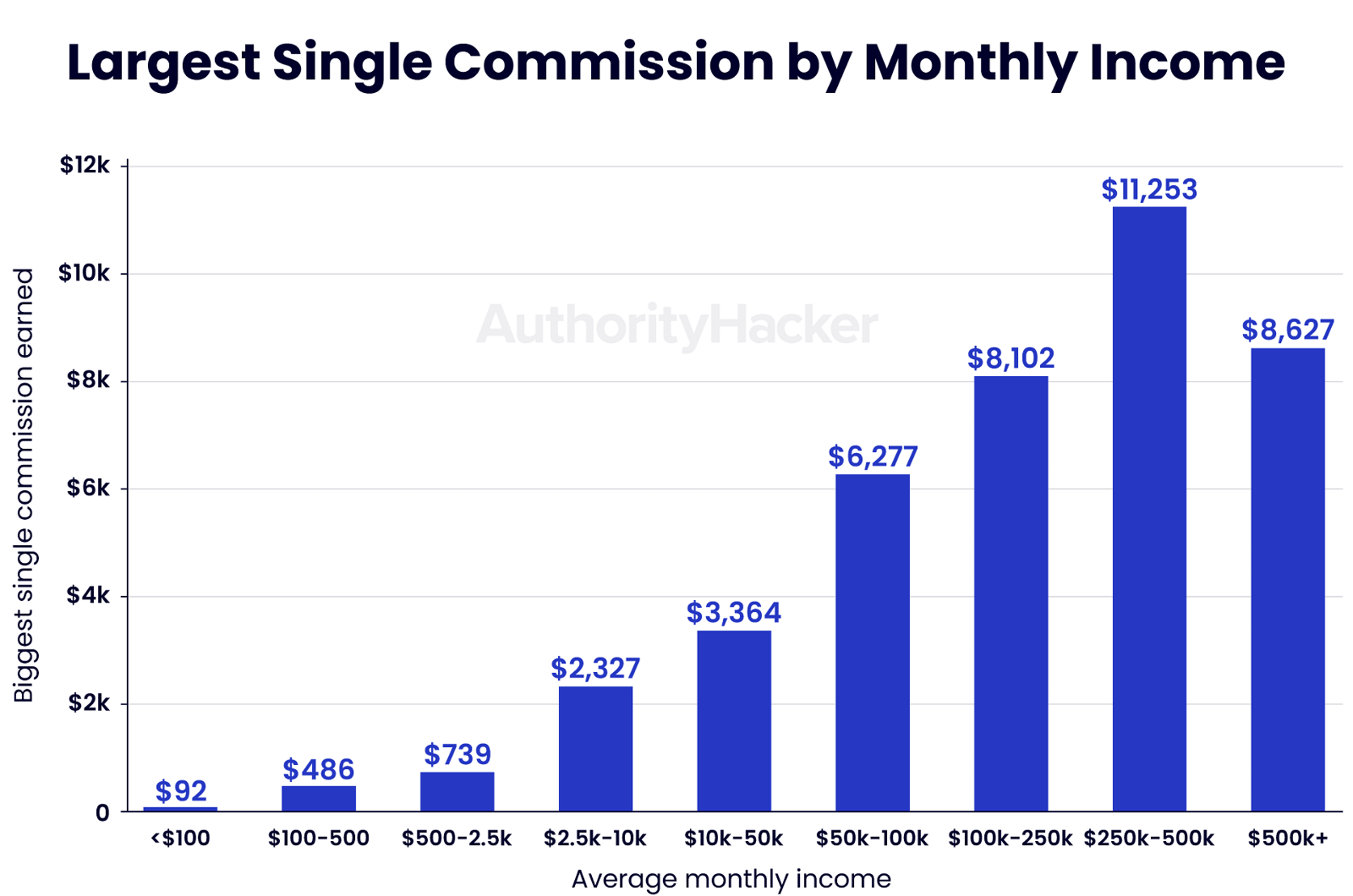
Part of this could be due to the fact that sites using Amazon Affiliate tend to rack up random high-value affiliate commissions over the years.
However, when we cross-referenced by niche, we didn’t notice a meaningful correlation between high-earning niches and largest commission. In fact, some of the most profitable niches are near the bottom of the list.
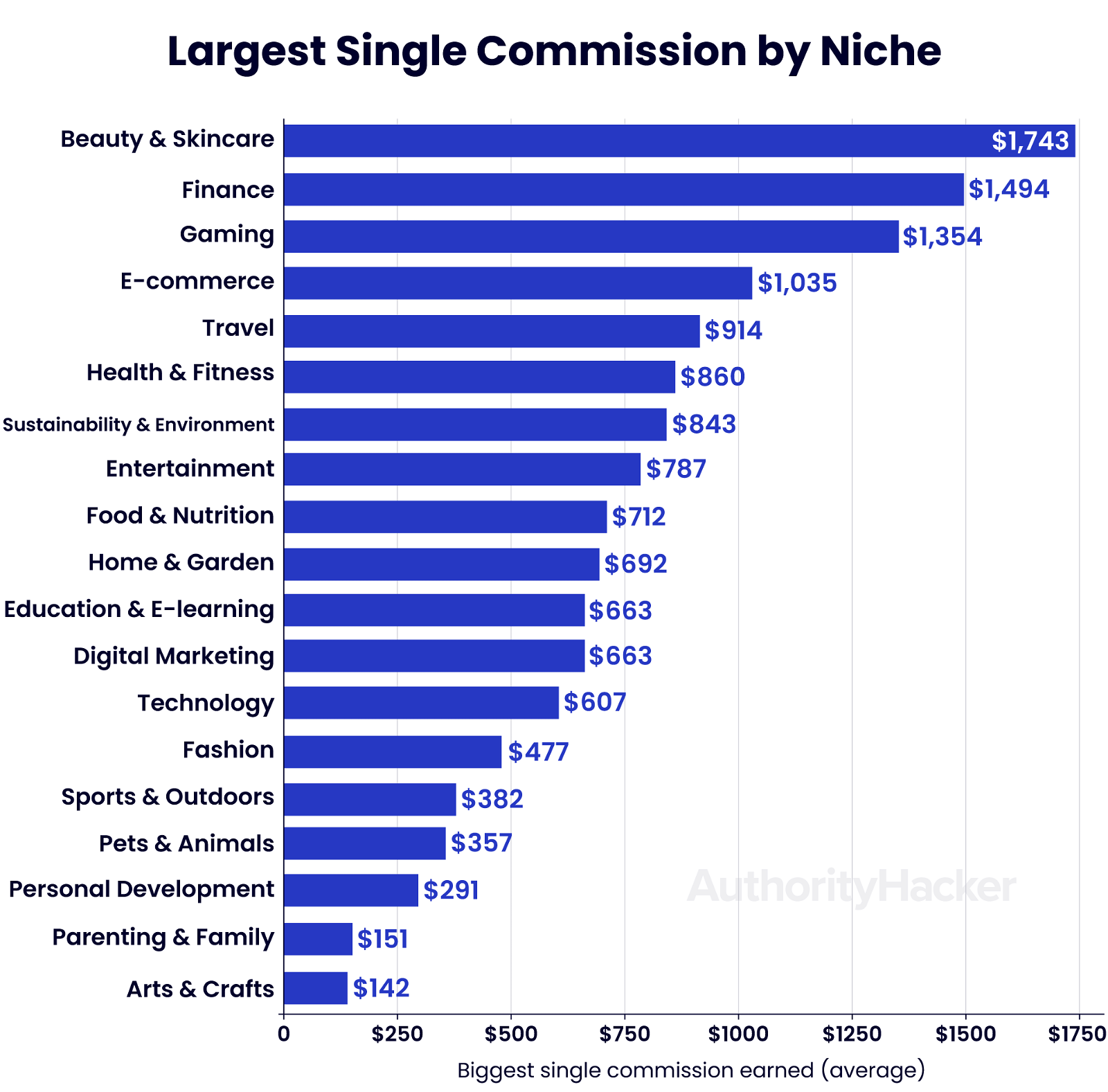
High product commissions are something to consider when picking a niche, but they’re not important enough to be the sole deciding factor. Other factors like niche popularity, competitiveness, and how well you know the topic are arguably more important.
The Average Affiliate Website RPM Is $149.76
I was shocked by this finding. We knew affiliate marketing could be profitable but survey results really put it into perspective. The data revealed that the average affiliate website earns $149.76 for every 1,000 visitors.
Here’s another shocker: websites earning $10,000+ per month make 3.58x more per visitor than average.
| Monthly income | Average website traffic | Earnings per visitor |
|---|---|---|
| <$100 | 9,217 | $0.0054 |
| $100-500 | 25,195 | $0.0119 |
| $500-2.5k | 61,322 | $0.0245 |
| $2.5k-10k | 118,471 | $0.0528 |
| $10-50k | 328,478 | $0.0913 |
| $50-100k | 350,238 | $0.2141 |
| $100k-250k | 690,714 | $0.2534 |
| $250-500k | 825,000 | $0.4242 |
| $500k+ | 937,500 | $0.5333 |
Most affiliate marketers would greatly benefit from improving their monetization and conversion rates. If you’re already getting decent traffic, it’s faster and more resource-efficient to 5x your RPM than it is to 5x your traffic.
82% Of High-Earning Websites Monetize With Both Affiliate Marketing And Display Ads
One of the more common debates in the industry is whether to monetize with ads or affiliate products.
We finally have an answer. 82% of websites earning 6+ figures per year use both, so you’re likely losing money if you’re not using ads. We also found that 69.4% of all respondents are using ads. The majority of affiliate marketers are on the right track, but there’s still room for improvement.
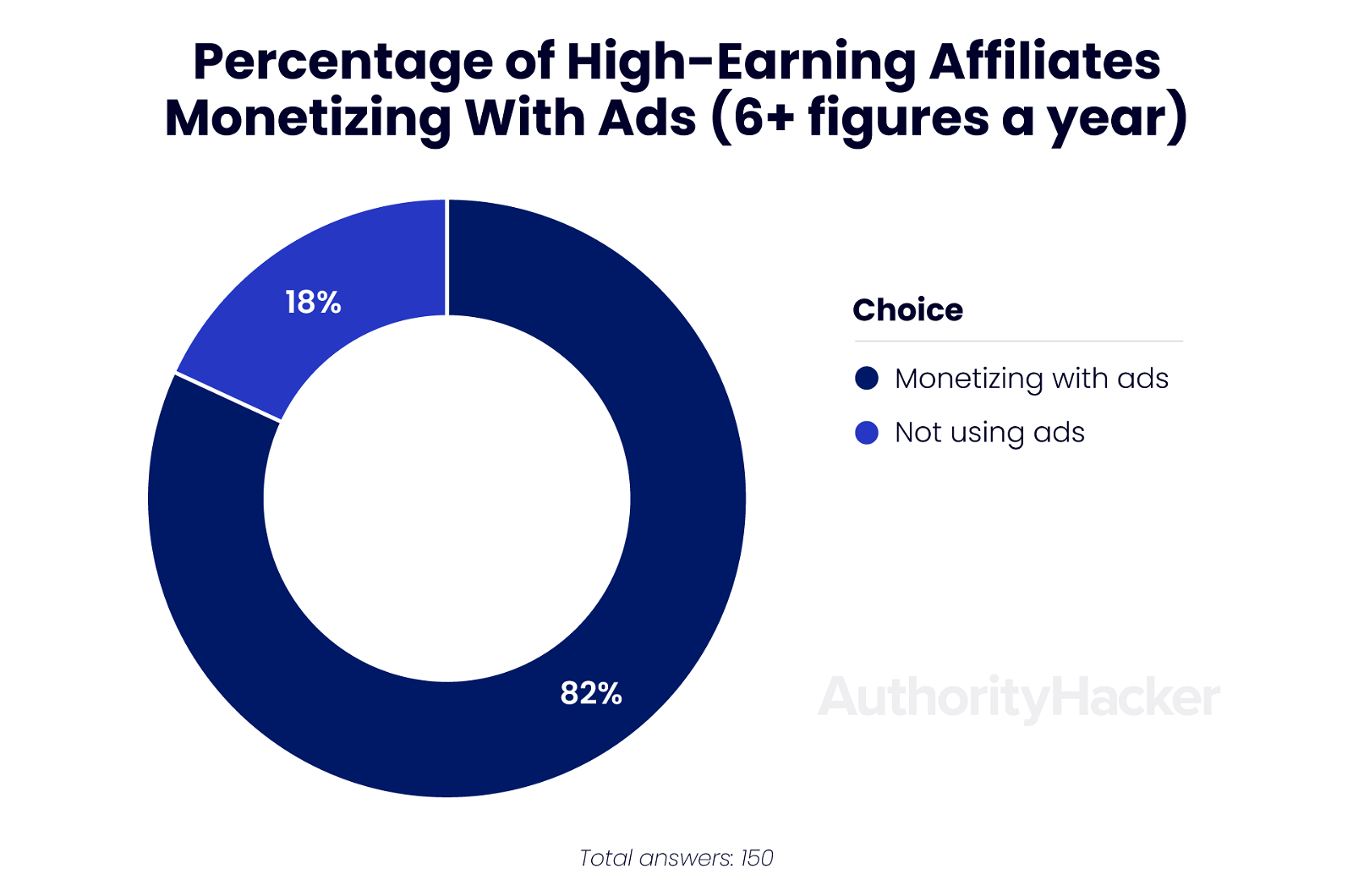
If you’re committed to only using one, know that affiliate marketing makes more than ads in 94% of niches. And it isn’t a close race – affiliate marketing earns at least 2x as much as ads in most niches.
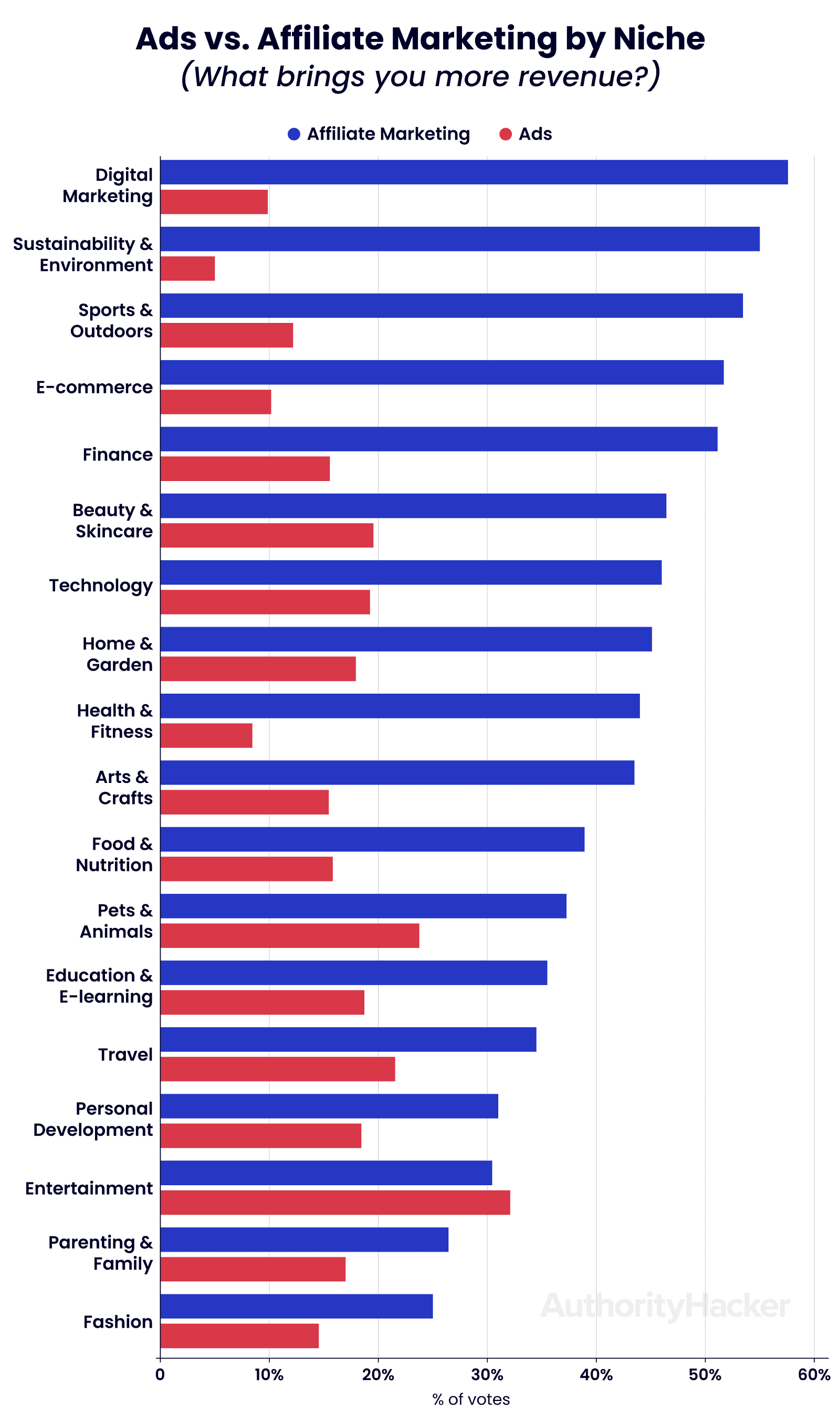
Enabling ads should increase revenue, and you should only avoid them if you’re highly concerned about your branding.
79.3% Of Affiliate Marketers Are Embracing AI-Driven Content Creation
Nearly 80% of respondents are embracing the shift toward AI content creation. This trend is universal across all tiers of experience. And seeing as Google has given the green light to responsible AI usage, why not?
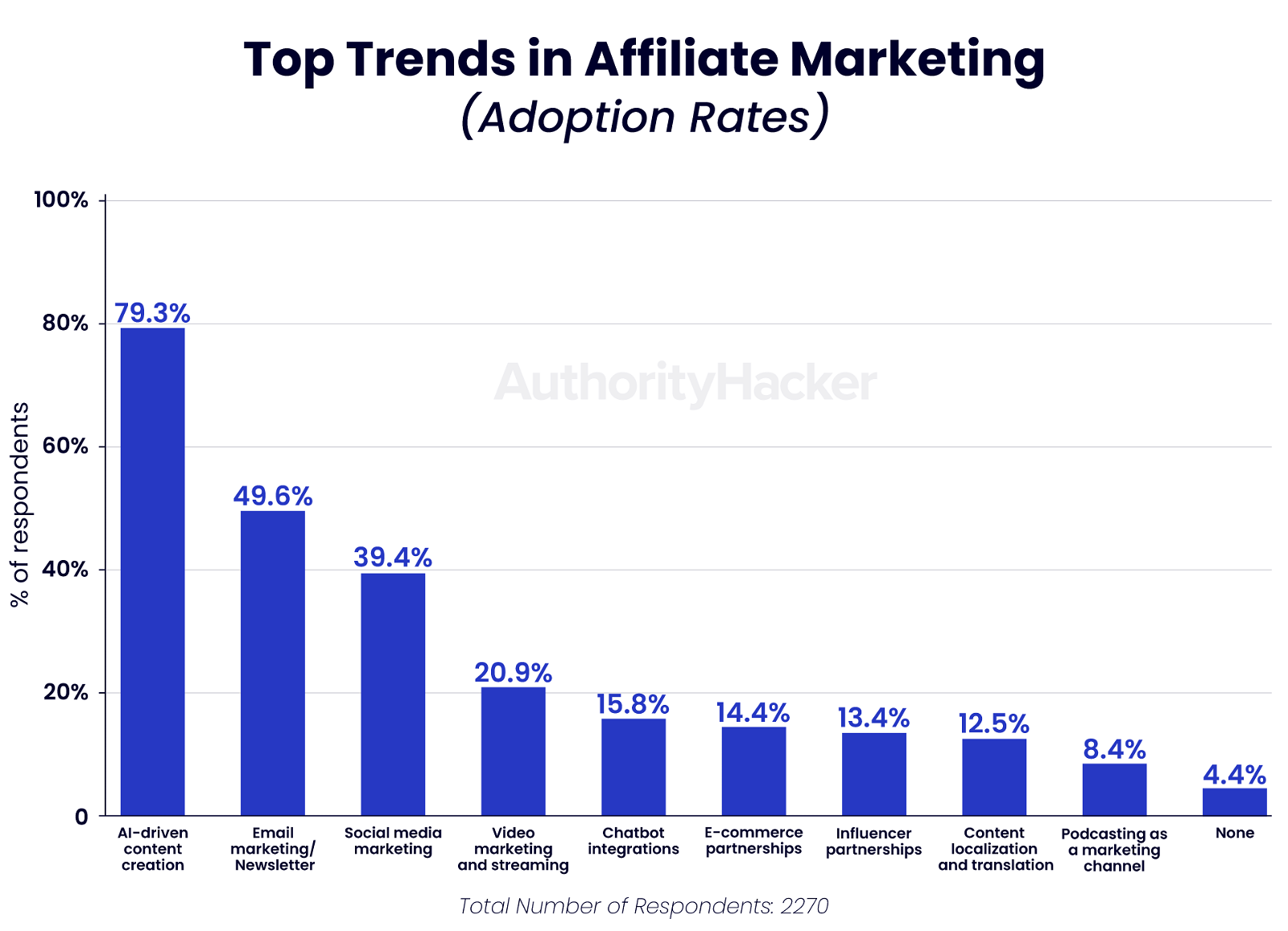
AI is definitely here to stay, and I would be surprised if this percentage didn’t grow in the coming years. For more AI usage statistics, check out our AI survey results.
Experts Use Email Marketing 47.8% More And SEO 11.6% More Than Beginners.
They also decrease reliance on organic social media over time, using it 26.7% less than beginners.
🗒️ Survey Note: Respondents could select multiple traffic sources.
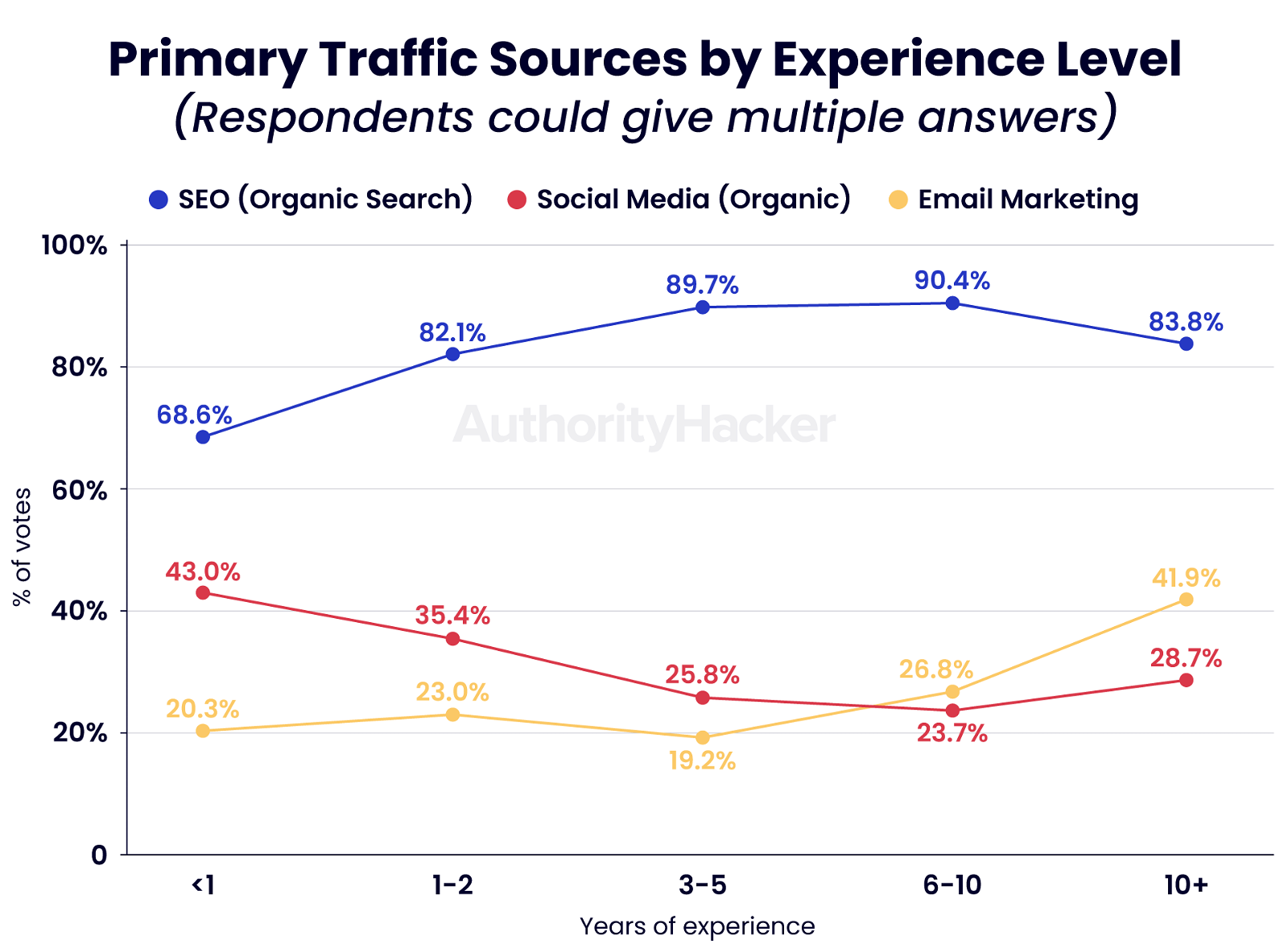
Given enough time, even simple email collection methods can build a substantial list. Marketers with more experience have had time to build larger lists, and a large email list typically generates more revenue than other sources of traffic.
Amazon Associates Remains The Most Popular Affiliate Network, With 58.5% Of Affiliate Marketers Using It
Despite all of the shade thrown at Amazon and its ever-decreasing affiliate rates, it’s still the most popular affiliate network by a large margin.
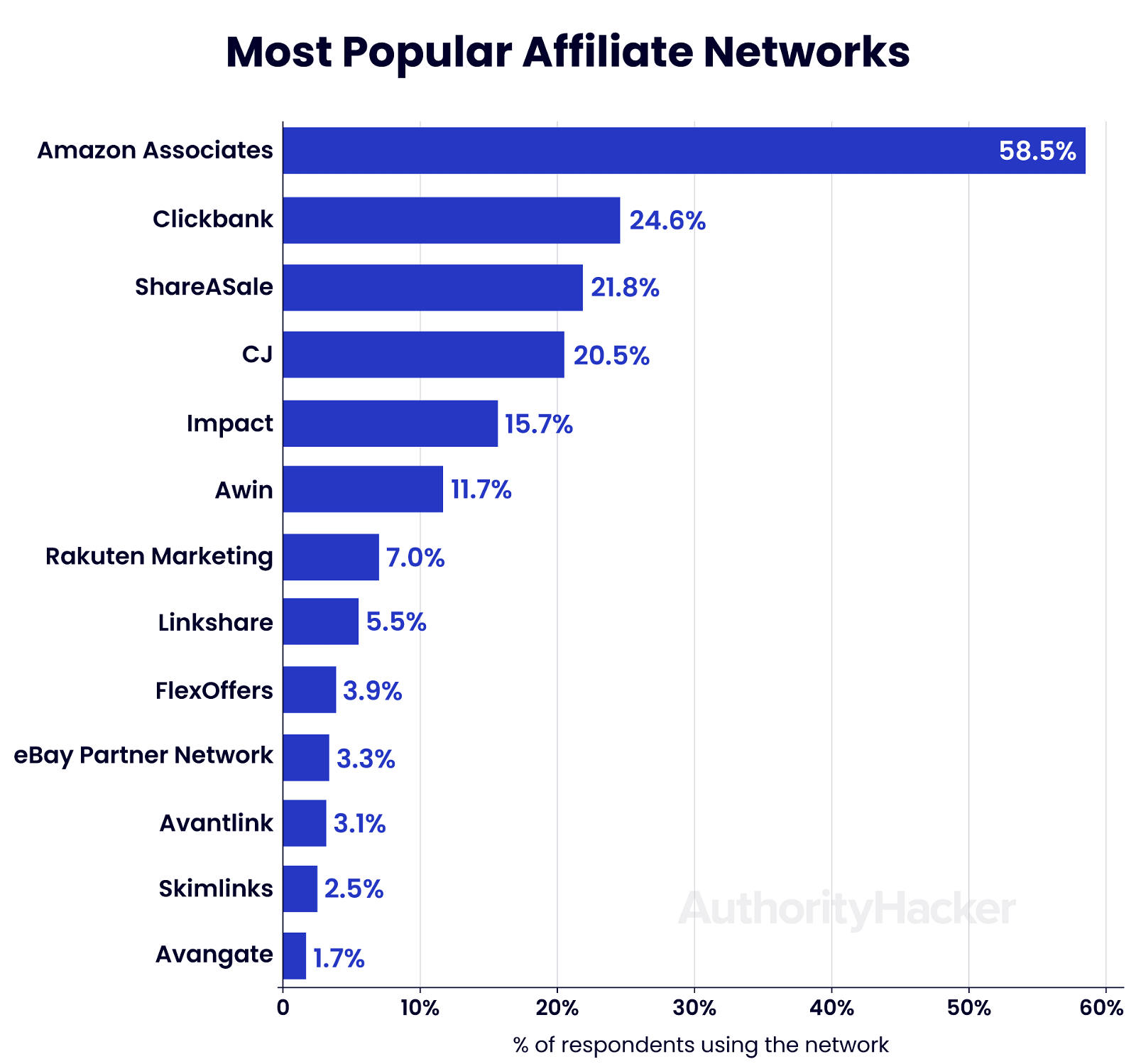
A common conception is that the Amazon affiliate program is for beginners. While it’s true that many beginners start with Amazon, nearly half of respondents making $10,000+ per month also use the program.
Despite the decrease in commissions over the years, Amazon remains the king of converting traffic into sales. Couple that with the fact that you earn commissions from everything your affiliate visitors buy, and the program remains lucrative for even the most successful affiliate websites.
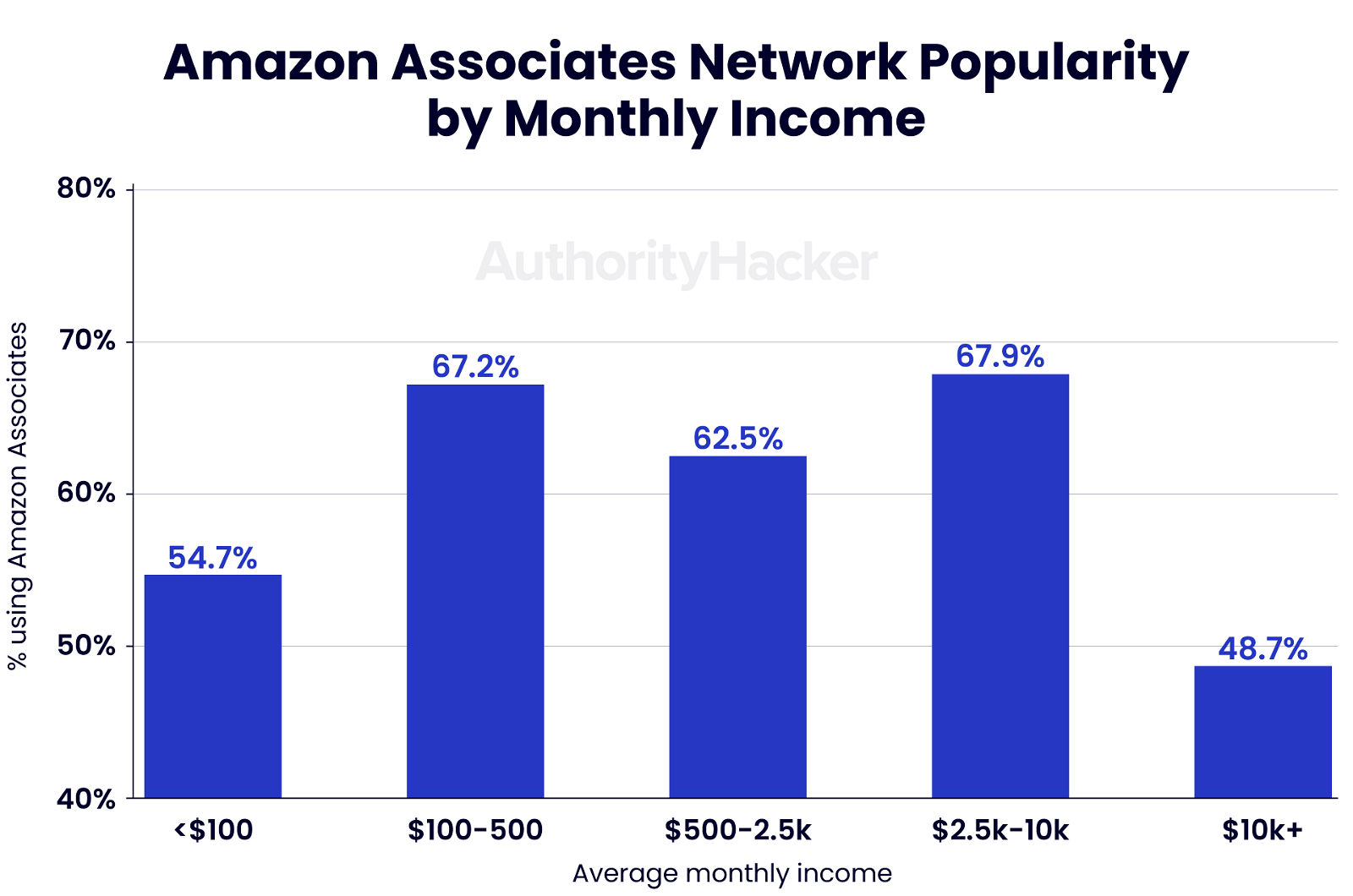
To learn more about how to leverage this program for maximum profit, read our guide on how to make money with the Amazon Affiliate Program.
77.1% Of Affiliate Marketers Are Solopreneurs With No Team Members
Most respondents are tapping away on their computers all by themselves. If you’re one of these solo crusaders, give yourself a pat on the back – we know it isn’t easy.
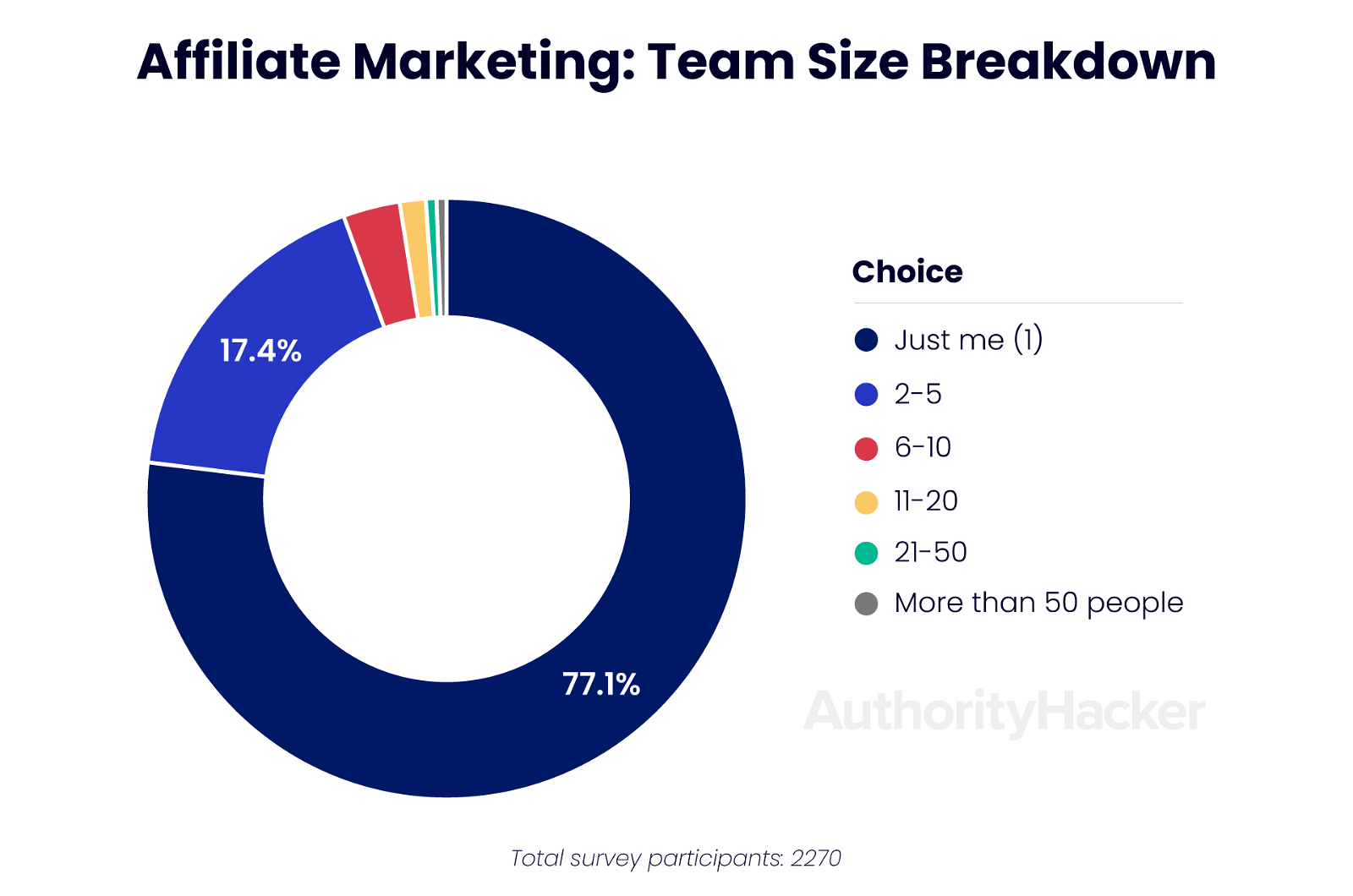
Most who do have teams don’t have large ones. The average team size is about 2.3 people, and 94.5% of affiliate marketers work in teams of 5 or fewer.
High Earners Are 1.5x More Likely To Socialize With Other Affiliate Marketers
If you’re one of the 64.4% of affiliate marketers who don’t socialize with other marketers, you should reconsider.
I’m not saying this to help you make friends – there’s a direct correlation between socializing and earning more. Seek out communities and masterminds to grow your network and affiliate marketing knowledge.
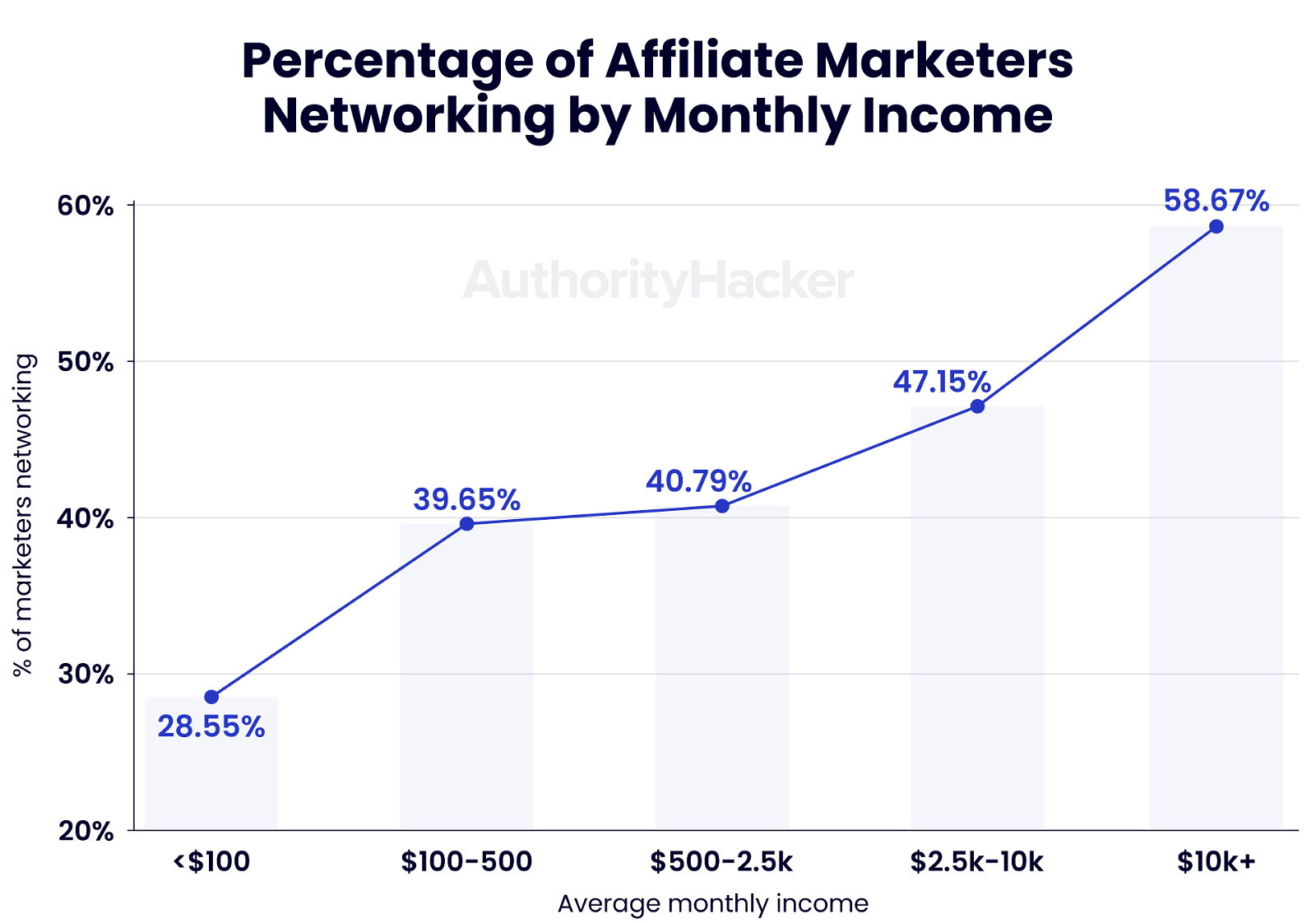
You should also be attending conferences when you can; people earning $10,000+ per month are 7x more likely to attend in-person conferences.
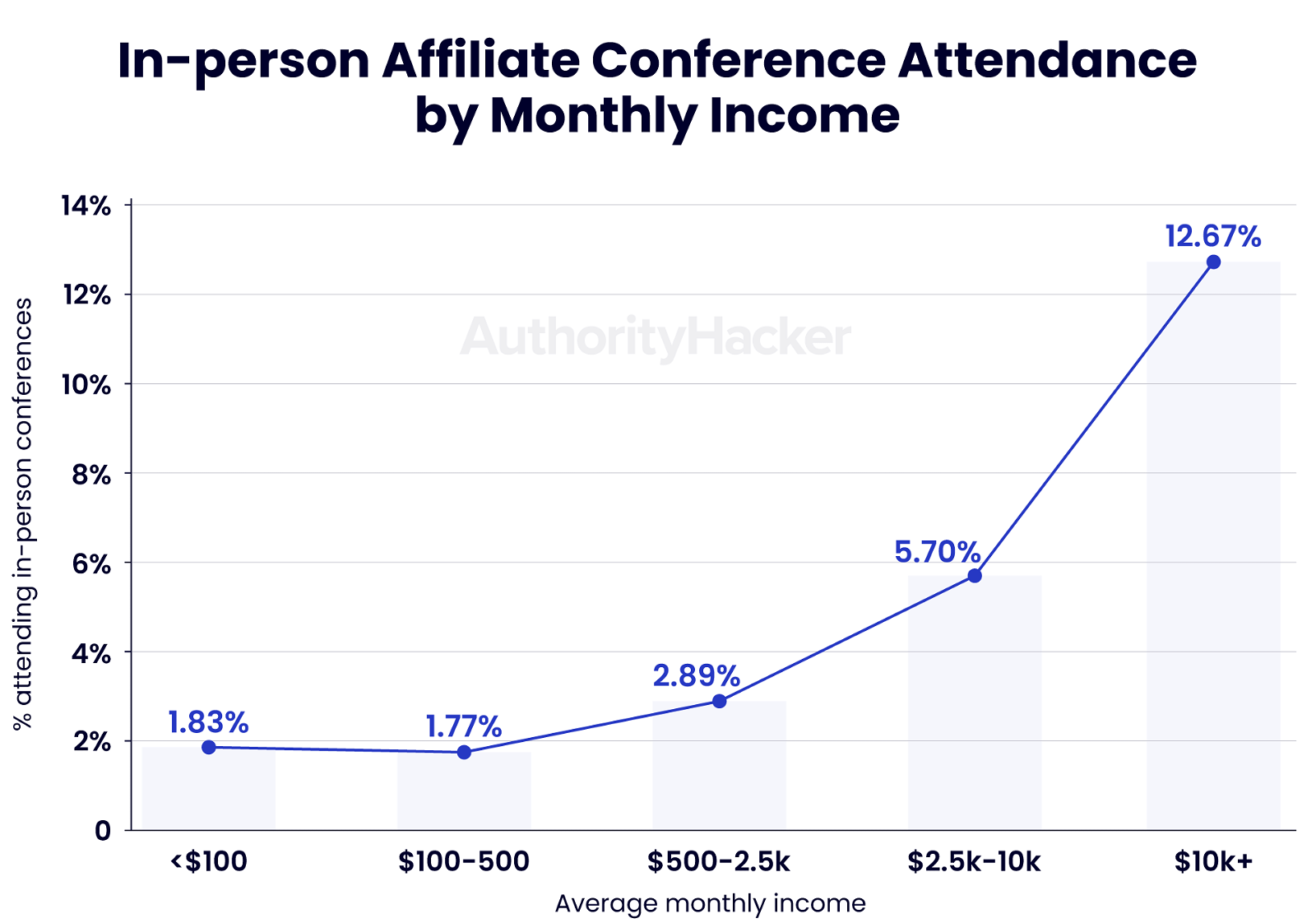
This may be because more successful marketers have the time and money to attend in-person events, but it’s also possible that the connections made face-to-face could enhance the advantages of online networking.
Newer marketers tend to socialize more over social media, while experts are sticking with online communities.
| Where do you socialize? | <1 year | 1-2 years | 3-5 years | 6-10 years | 10+ years |
| Social media | 20.20 | 21.11 | 22.54 | 15.66 | 17.96 |
| Online communities | 9.80 | 13.43 | 14.32 | 13.13 | 17.96 |
| In-person | 2.48 | 2.35 | 2.58 | 6.06 | 5.39 |
Affiliate Marketers Who Use Email Marketing Earn 66.4% More Than Those Who Don’t
While only 22.8% of affiliate marketers utilize email, those who build an email list to promote products earn significantly more than those who don’t bother with email.
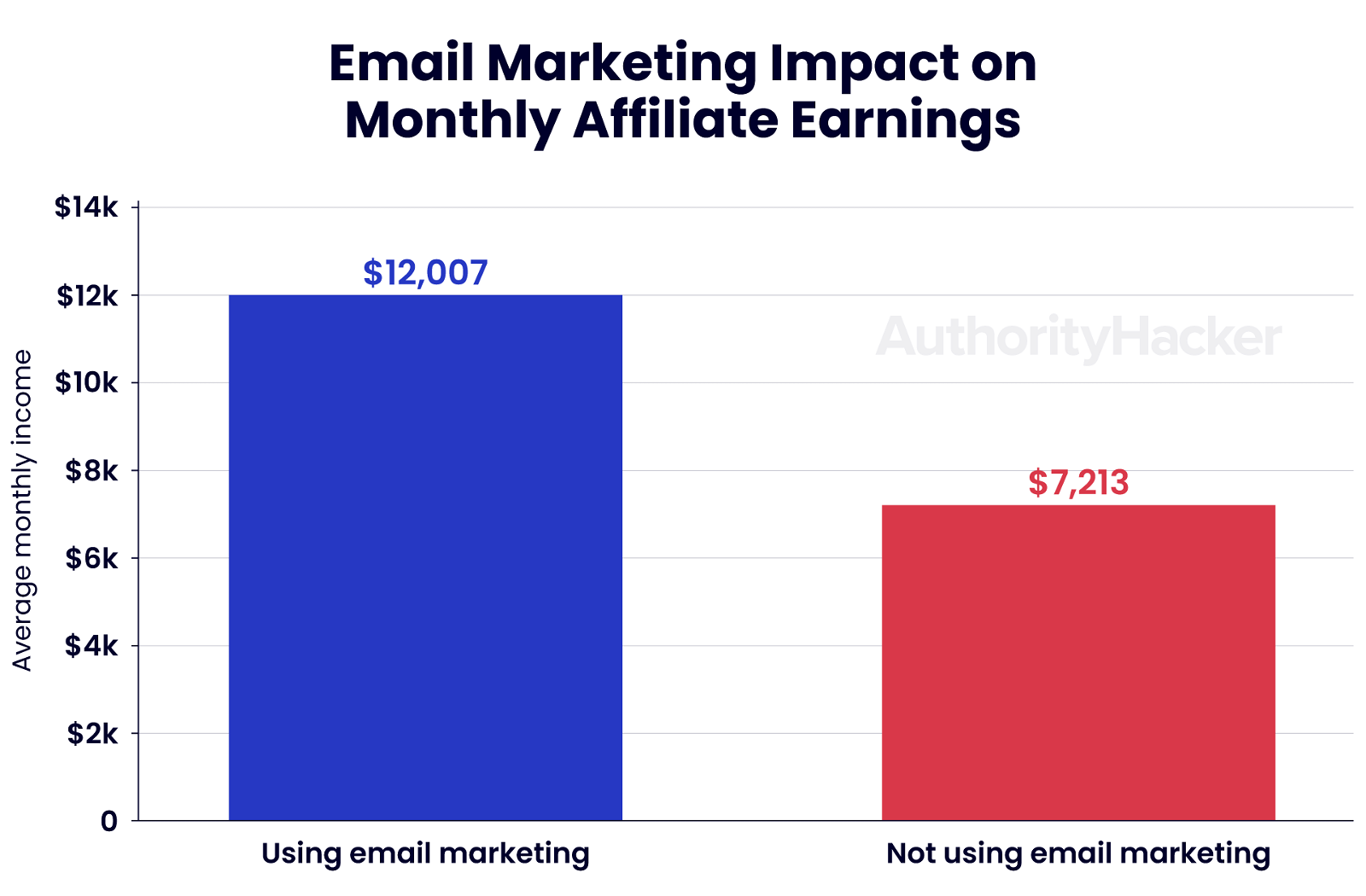
Here are some potential reasons for this:
- Email is the only channel that allows you to guide your audience through a series of messages in a pre-determined order. This precision is invaluable when it comes to selling a product.
- By opting into your list, email subscribers have proven they care much more about your opinion than the average visitor.
- It may also reflect the typical evolution of an affiliate marketer. Most only look into email once they’ve mastered more standard affiliate strategies and begun to stagnate. This leads them to look for new ways to monetize.
It’s the same as with ads; if you’re not using email, you’re leaving money on the table.
And when it comes to your email list, size matters. Affiliate marketers earning at least $10,000 per month have an average of 258,917 more subscribers than lower earners. They also make 9.97x more per subscriber.
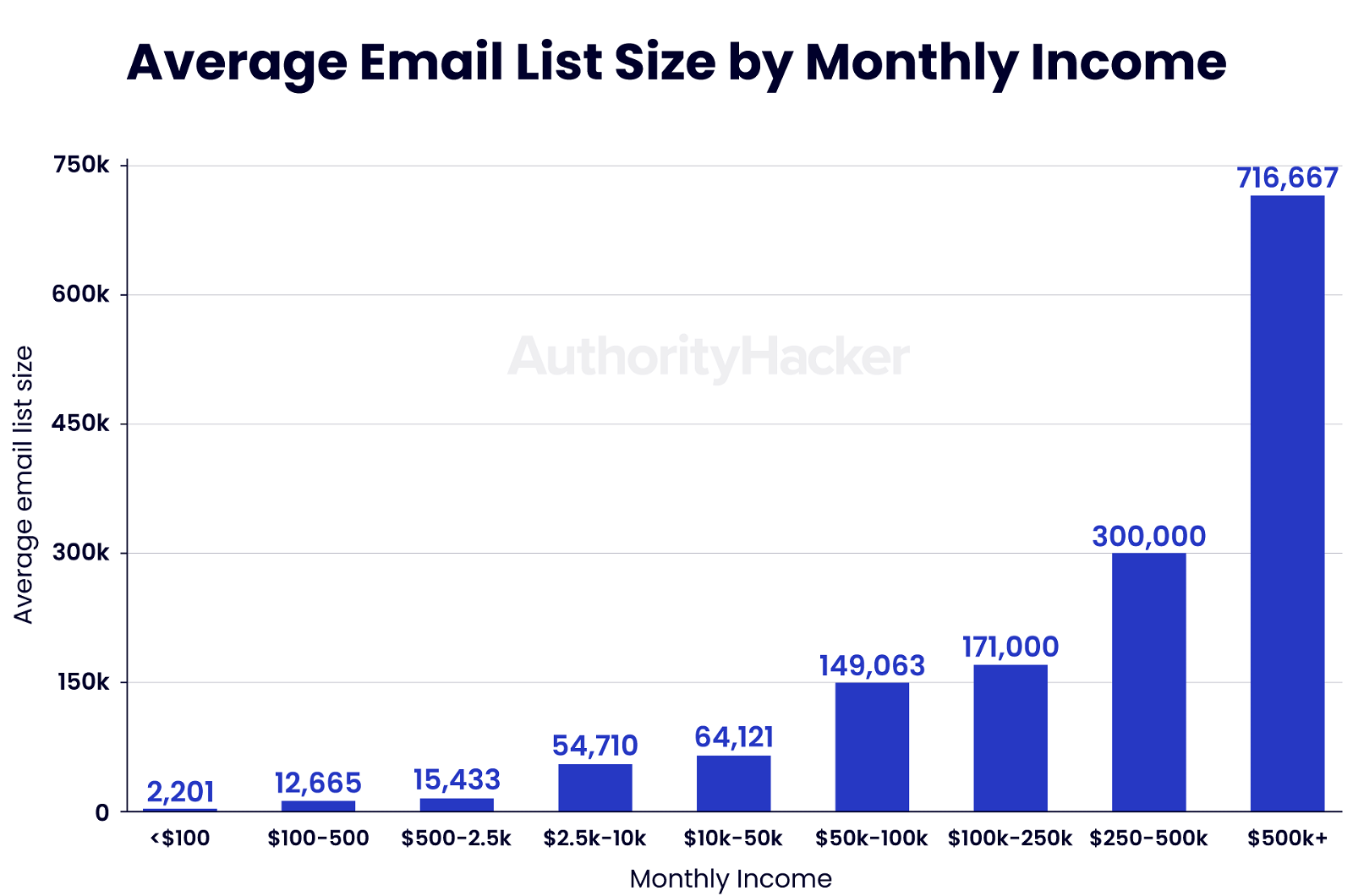
This is similar to the traffic monetization trend. High earners have bigger lists, but they also know how to earn more per subscriber.
75.5% Of Affiliate Marketers Find Time-Sensitive Promotions Have Little To No Impact
Our co-founder Gael says that a countdown timer can outperform even the best copywriter. So, it was a surprise when 75.5% of respondents reported that time-sensitive promotions had little to no impact on their revenue.
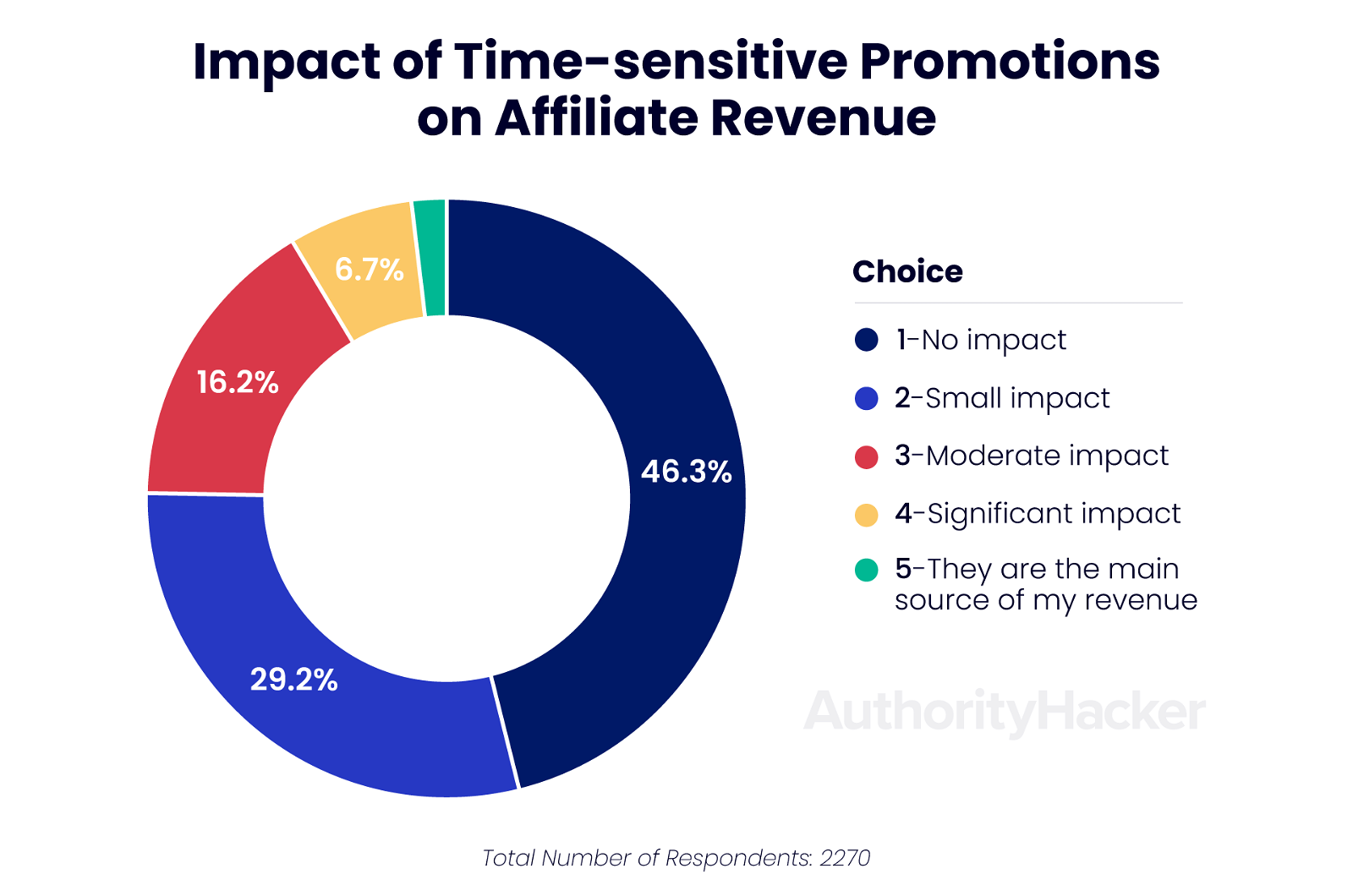
The businesses that run these sales definitely see an impact – that’s why they run the sales. So why aren’t affiliate marketers taking advantage of this proven promotional tactic?
Most people use organic traffic sources, and the buying window for time-sensitive promotions is usually a few hours. These urgency-based promotions don’t impact cold organic traffic nearly as much as traffic from an audience that you’ve built a relationship with and have a history of recommending great products to.
This lines up with most respondents not using email or social media, which are common ways to build and engage with an audience.
Given that almost half of respondents perceive no impact, there may be opportunities for some marketers to explore or optimize their approach to these promotions.
Of those who report time-sensitive promotions having an impact, the channels where they had the most impact include influencer marketing, paid ads, and email marketing.
This is likely because marketers push paid ads and email marketing more during seasonal promotions, which can impact their revenue more than steady traffic sources like SEO and organic social media.
Only 25.1% Of Affiliate Marketers Have Been Negatively Impacted By Recent Search Algorithm Updates.
If you take a peek into the average affiliate marketing forum, you’ll see many people reporting that their site traffic has tanked due to recent search algorithm updates.
Given the vocal negative sentiment about recent updates that has taken hold of the industry, we found it surprising that only a fourth of affiliate marketers saw a negative impact from recent updates.
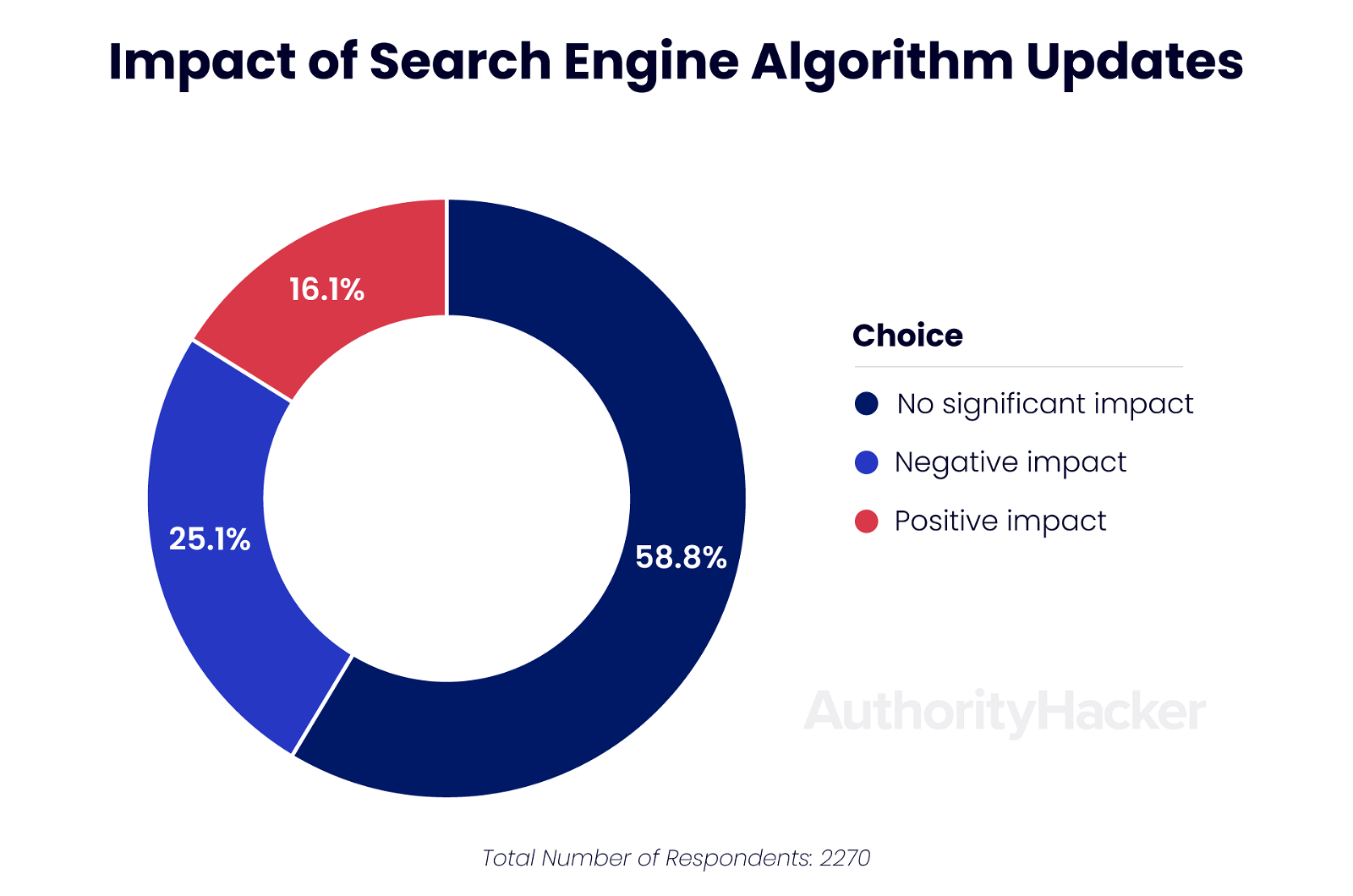
We also noticed an interesting lack of correlation when filtering for negative impact across traffic sizes, experience levels, and niches. This suggests that the niche, size, and age of the websites did not play a decisive role.
It’s tough to determine exactly why these sites lost traffic, but we believe lack of EEAT may be one of the most likely causes. For more on how to properly address EEAT issues, check our detailed YouTube video.
We did notice that high earners saw positive impacts 2x as often than lower earners. That’s not too surprising, as people who reach higher revenue levels are likely more precise with their content and website strategy.
47.4% Of Affiliate Marketers Who Lost Traffic Changed Their Content Strategy
We also asked those who lost traffic about how they pivoted their strategies.
The most common shifts involved changing content strategy (47.4%) and diversifying the products and services they promote (18.9%).
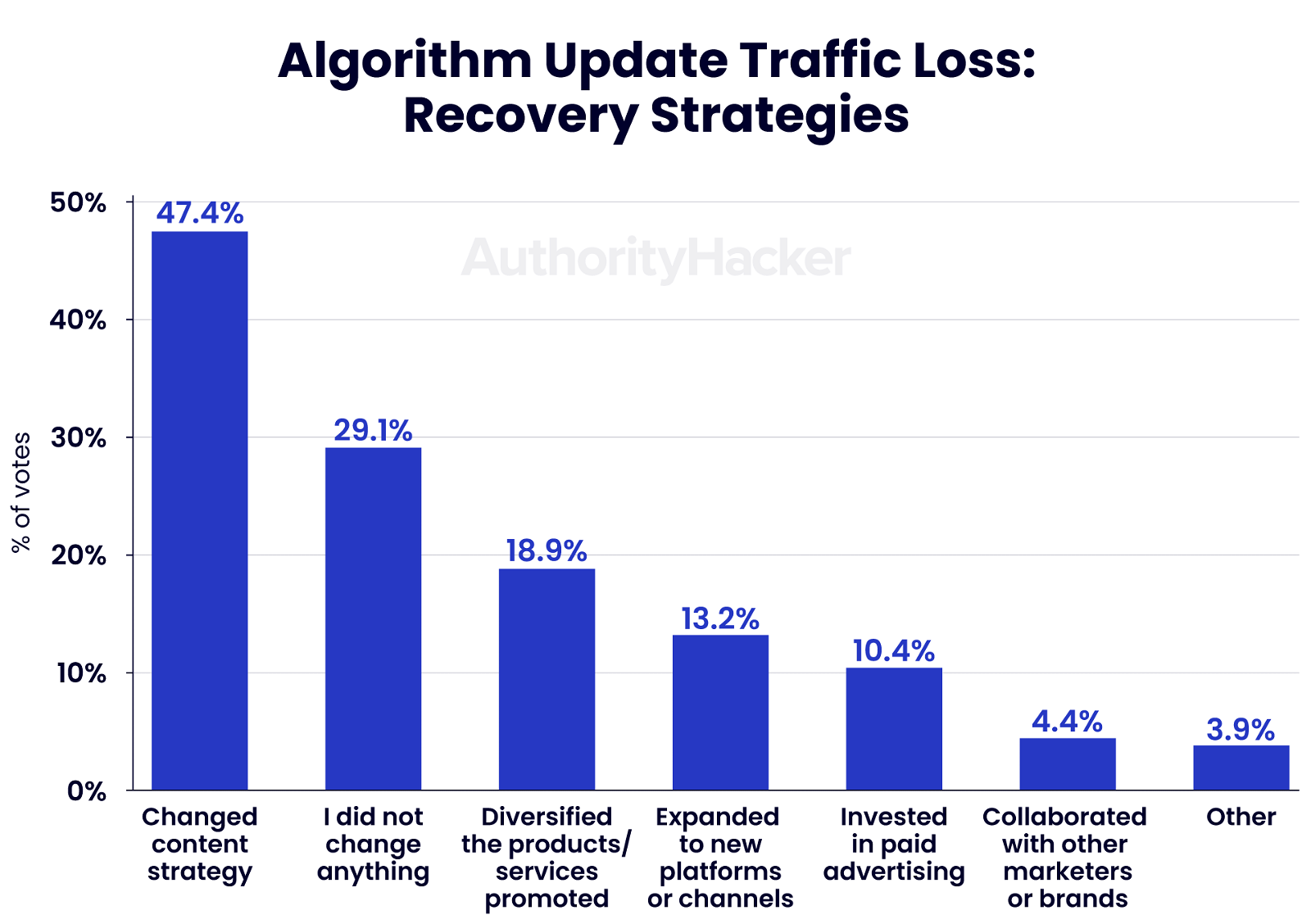
Surprisingly, 29.1% reported not changing anything. This could be due to not knowing what caused the drop, as even the most experienced affiliate marketers find deciphering Google’s preferences challenging.
31.3% Of Affiliate Marketers Earning 6+ Figures Considered Giving Up At Some Point
Nearly a third of those making 6+ figures per year almost threw in the towel at some point.
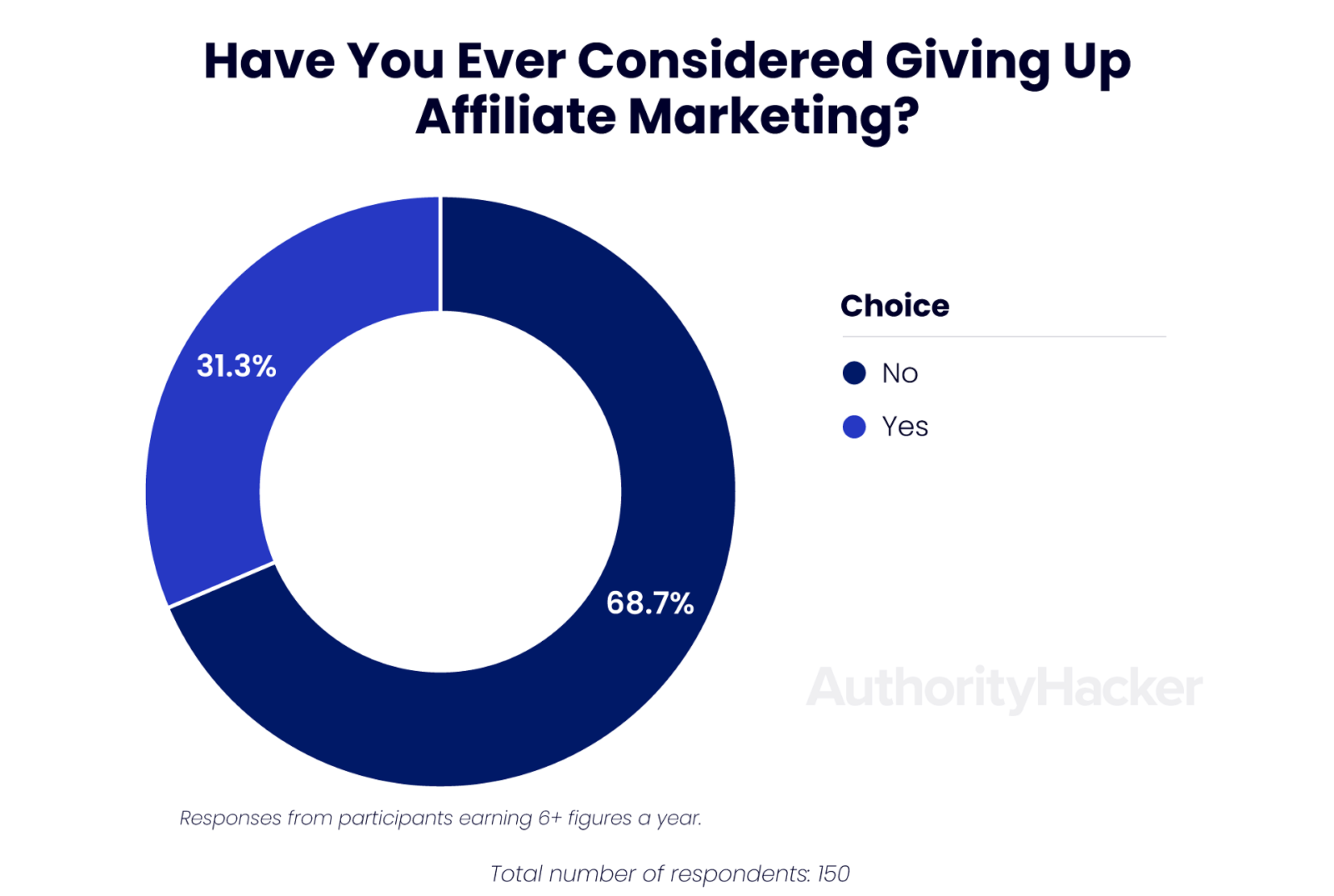
This image encapsulates that sentiment perfectly:

This fact alone is pretty motivating – if you’re having thoughts of giving up, know that many who had these thoughts before you ended up winning big.
When we filtered this question by experience, we found something really interesting. There was virtually no difference between any of the experience brackets.
About 50% of all respondents – beginners, journeymen, and experts – have considered quitting at some point. The data was eerily consistent, with less than a 2% differential across all experience levels.
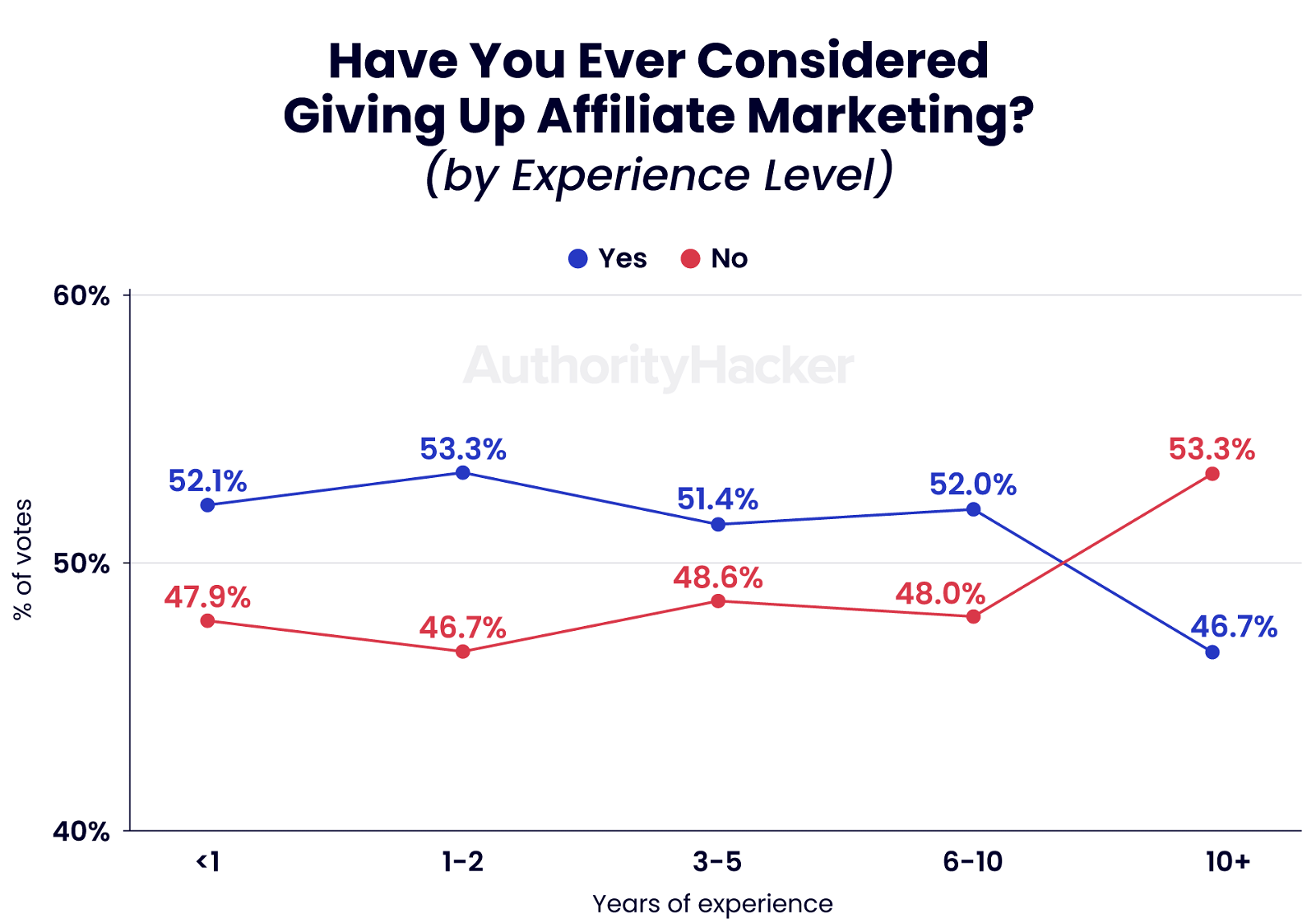
This points to an interesting phenomenon – that half of affiliate marketers experience a make-or-break decision point near the start of their journey.
I believe they quickly gain a deeper understanding of what’s involved in becoming a successful affiliate marketer – creating content, studying conversion optimization, and generally spending a lot of time on the computer – and decide if it’s for them.
If they make it through that, they tend to stay for good.
We can call this the 50/50 affiliate marketing drop point, if you’ll allow me to coin a phrase.
85.8% Of Affiliate Marketers Who Use Social Media To Drive Traffic Have Less Than 10,000 Followers
Even though social media constitutes the second largest source of traffic, the vast majority of those who leverage social media have less than 10,000 followers.
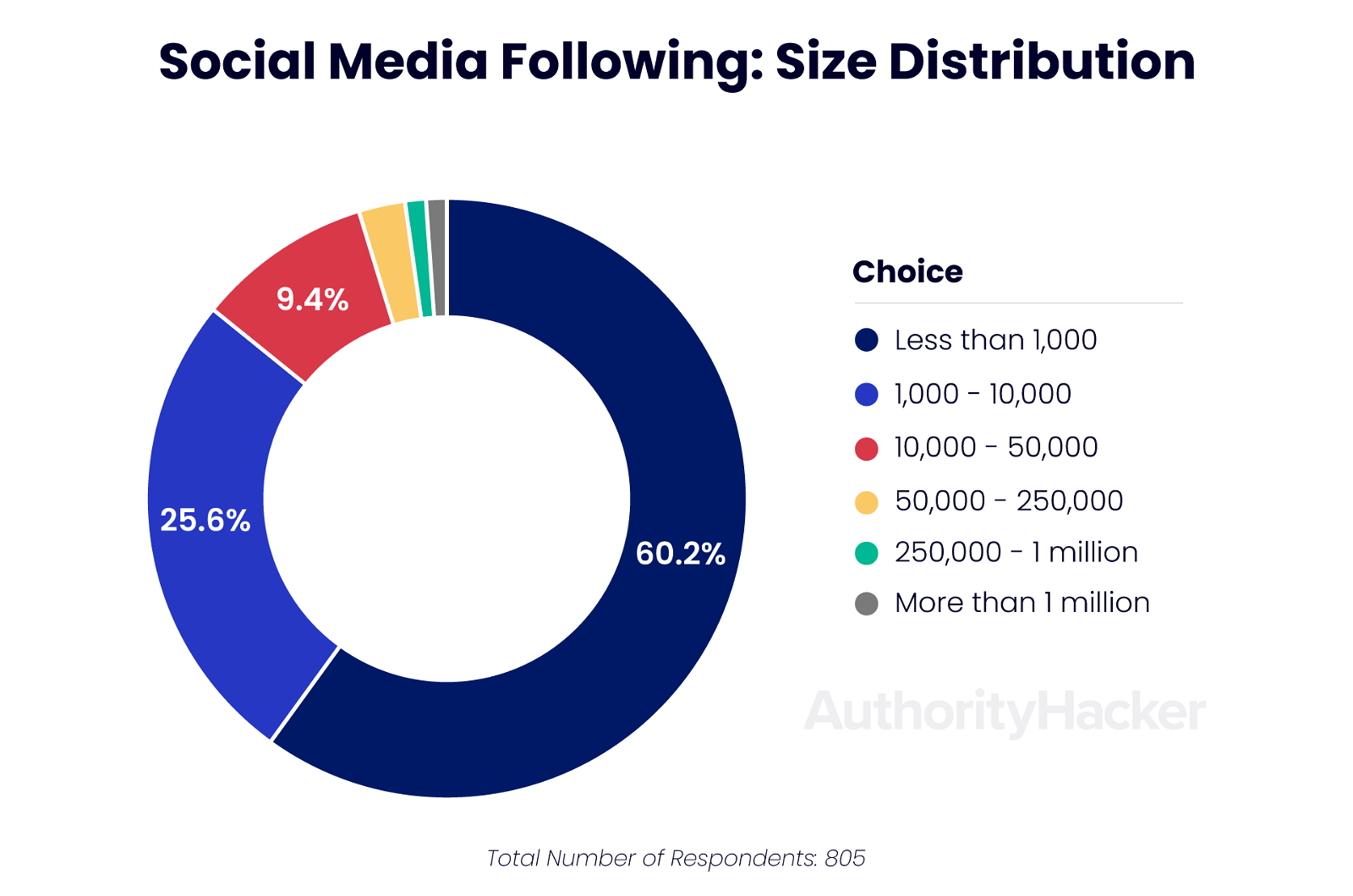
More experience in the field does correlate with more followers, but growth is not as linear compared to SEO – jumps are sharper and less frequent.
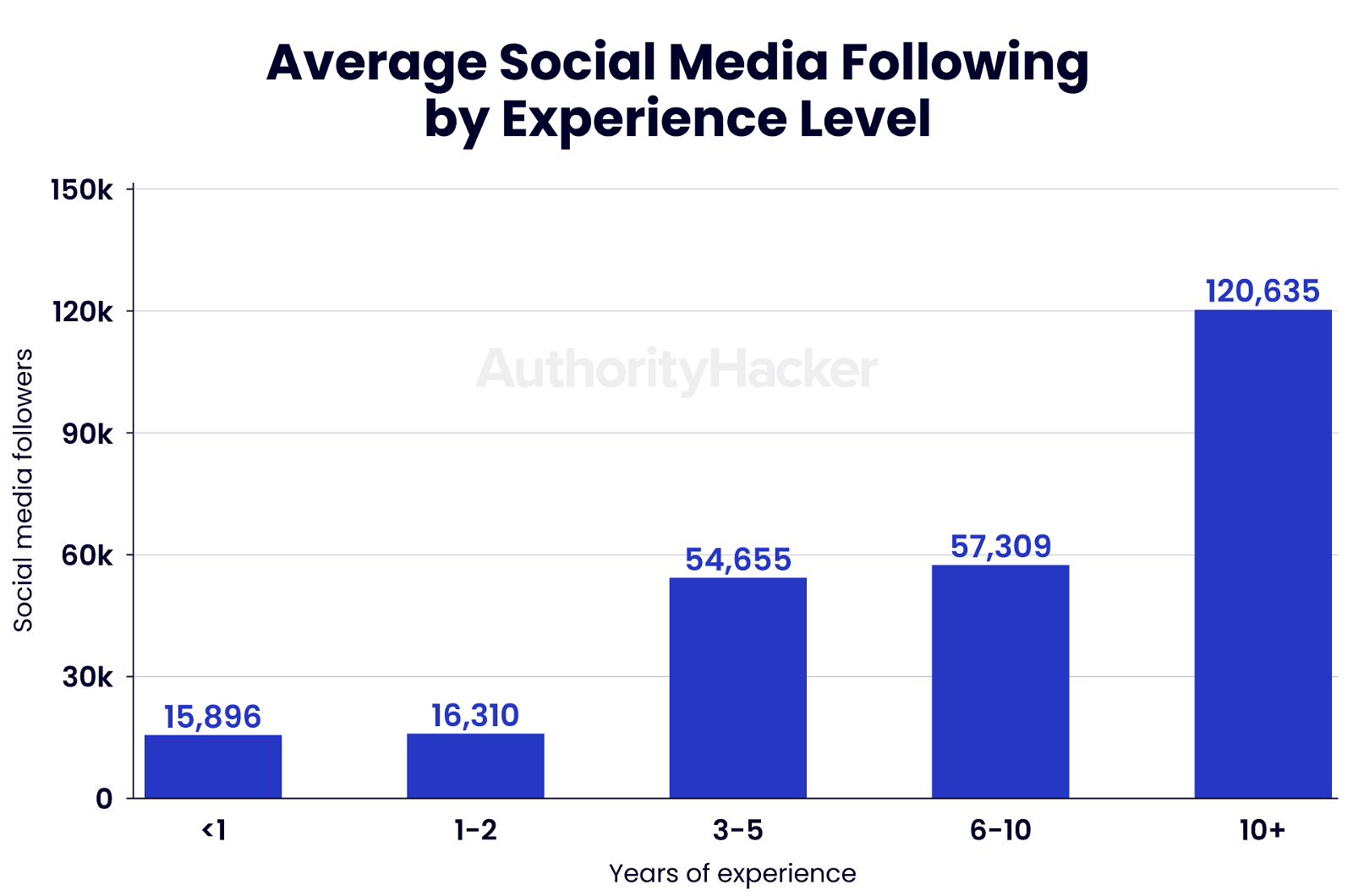
Cross-referencing followers with earnings shows a similar trend – higher income correlates with higher follower counts. However, there’s a clear stagnation once you hit 3 years of experience and $500 per month.
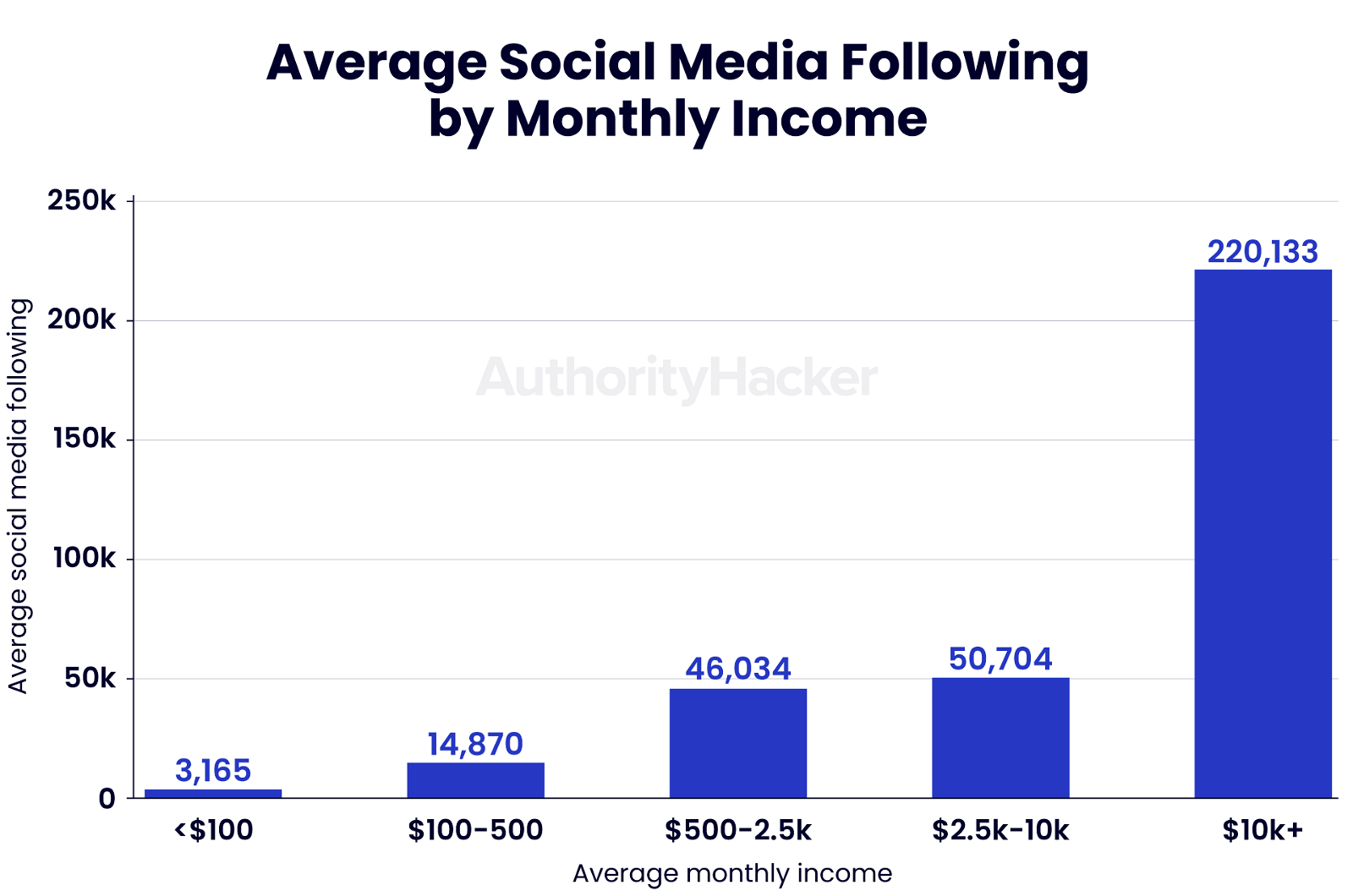
There are a few potential takeaways here.
Follower count has become a vanity metric on most social platforms. It looks nice, but having a lot of followers doesn’t mean your posts will get traction. The algorithms simply won’t show your posts to your followers if the initial engagement is poor.
Remember, over a third of marketers are using social media as a primary traffic driver. The low average follower count could indicate that some of these respondents are driving substantial traffic with social media despite having newer accounts with few followers.
Seasoned marketers are also placing less emphasis on their social channels than they were in the beginning. This correlates with a finding I mentioned previously – that affiliate marketers use less social media as they gain more experience.
We’ve found that using social media is a weaker affiliate marketing tactic, so this lines up with our experience. That’s why advanced marketers focus more on email while newbies focus on social.
83.1% Of Affiliate Marketers Are Optimistic About The Future Of Affiliate Marketing
Between the introduction of AI to search, the endless stream of AI content tools, and the flurry of search algorithm updates in the past year, there’s been a lot of doom and gloom surrounding the affiliate marketing industry.
However, affiliate marketers across all levels of experience are almost universally positive about the future.
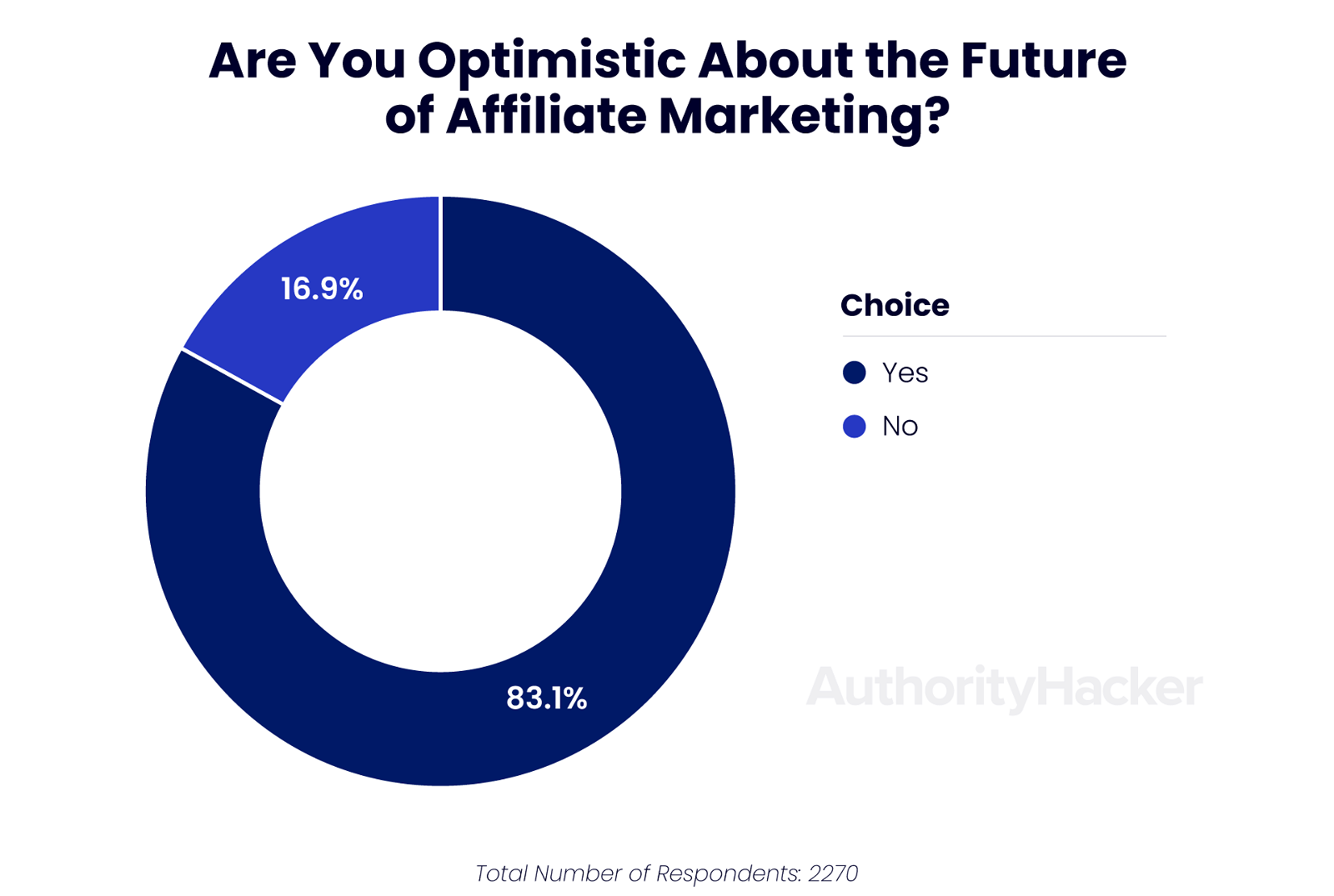
We can’t see what’s coming, but even in this ever-changing information economy, it’s hard to envision one where original and helpful content doesn’t continue to play a vital role.
Affiliate marketing has been through plenty of “end of the industry” calamities, and nothing has ended.
Sure, we’ve had to adapt our strategies to new technologies and search algorithm updates, but affiliate marketers who have successfully shifted with the times have only continued to reach new heights.
I predict that trend will only continue, and it seems most respondents agree.
66% Of Affiliate Marketers Earning $10,000+ Per Month Have Taken Affiliate Marketing Courses
Education pays off – even in the Wild West of affiliate marketing. Top earners are far more likely to have taken affiliate marketing courses than not.
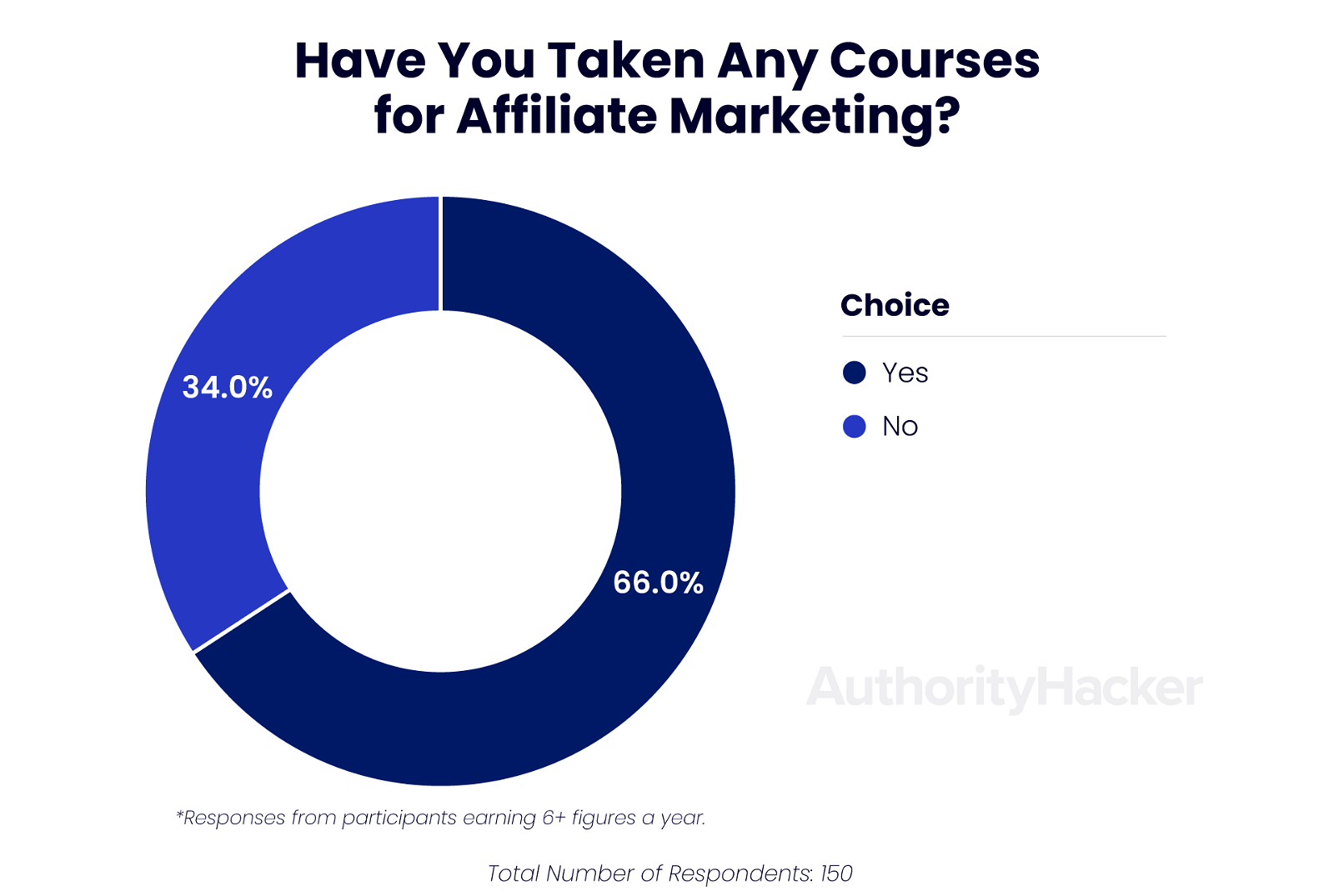
We also found that beginners – AKA affiliate marketers with less than 3 years of experience – who take affiliate marketing courses earn 57.7% more than those who don’t.
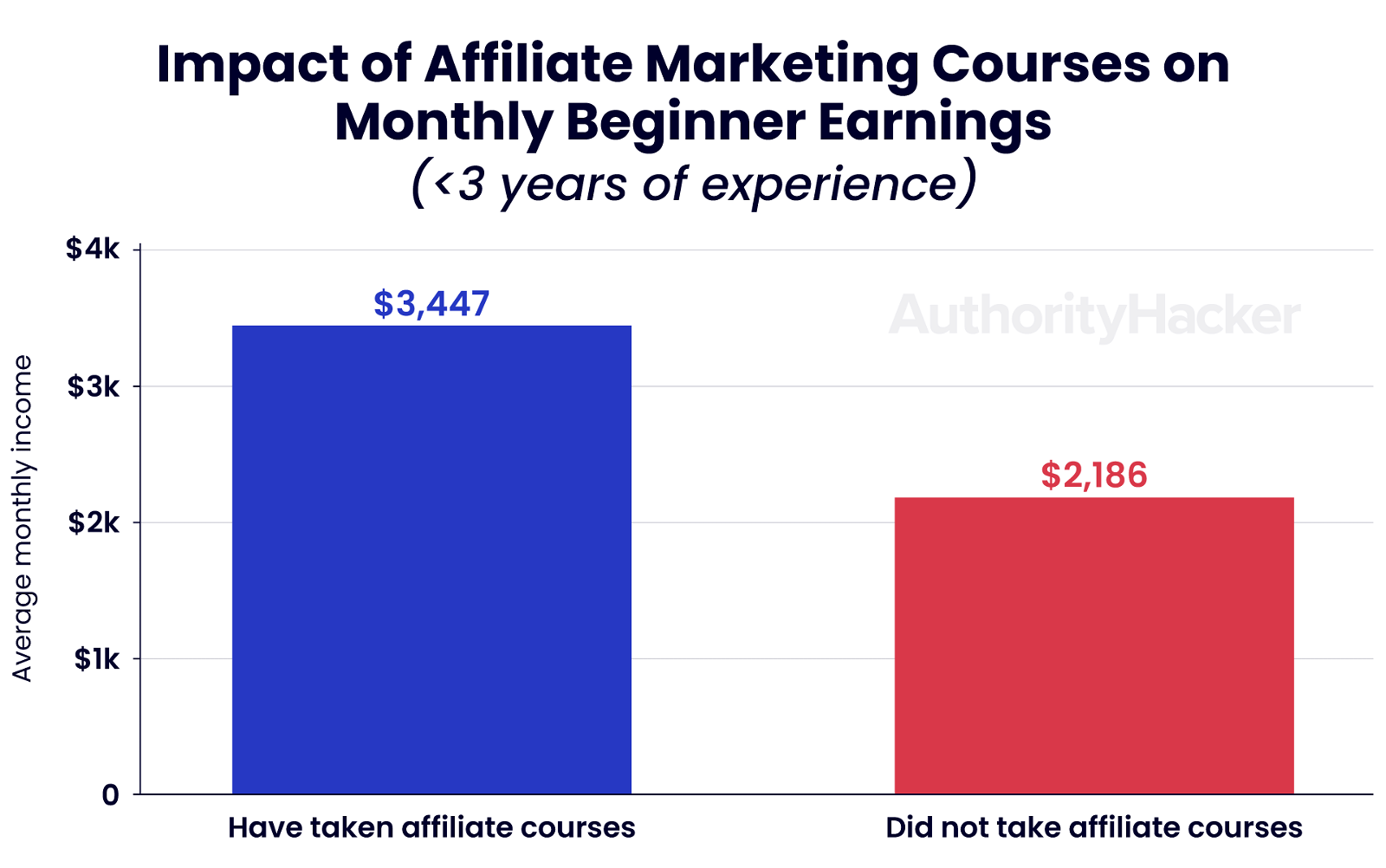
If you’re serious about succeeding in affiliate marketing, I encourage you to check out our free authority site training.
You’ll learn 7 tips to make a new website 83% more successful, and it gives you a sneak peek at our full course, which offers 14279 196 value-packed lessons that over 14279 affiliate marketers have signed up for so far.








